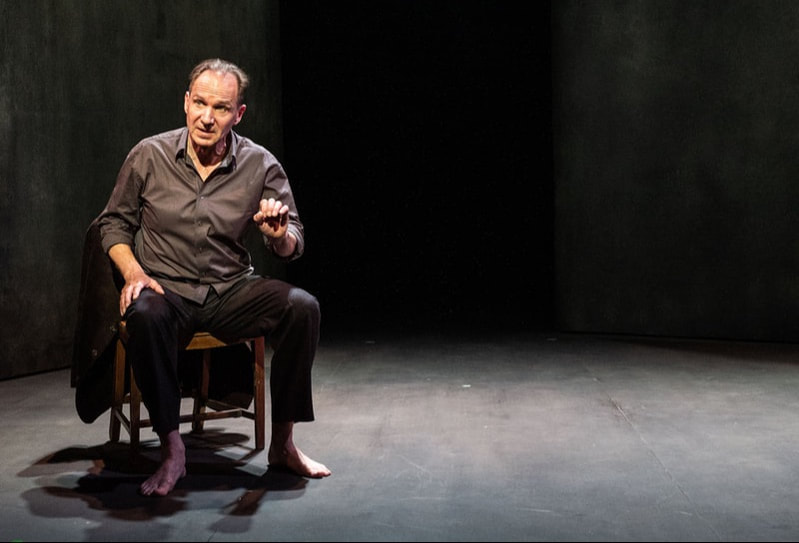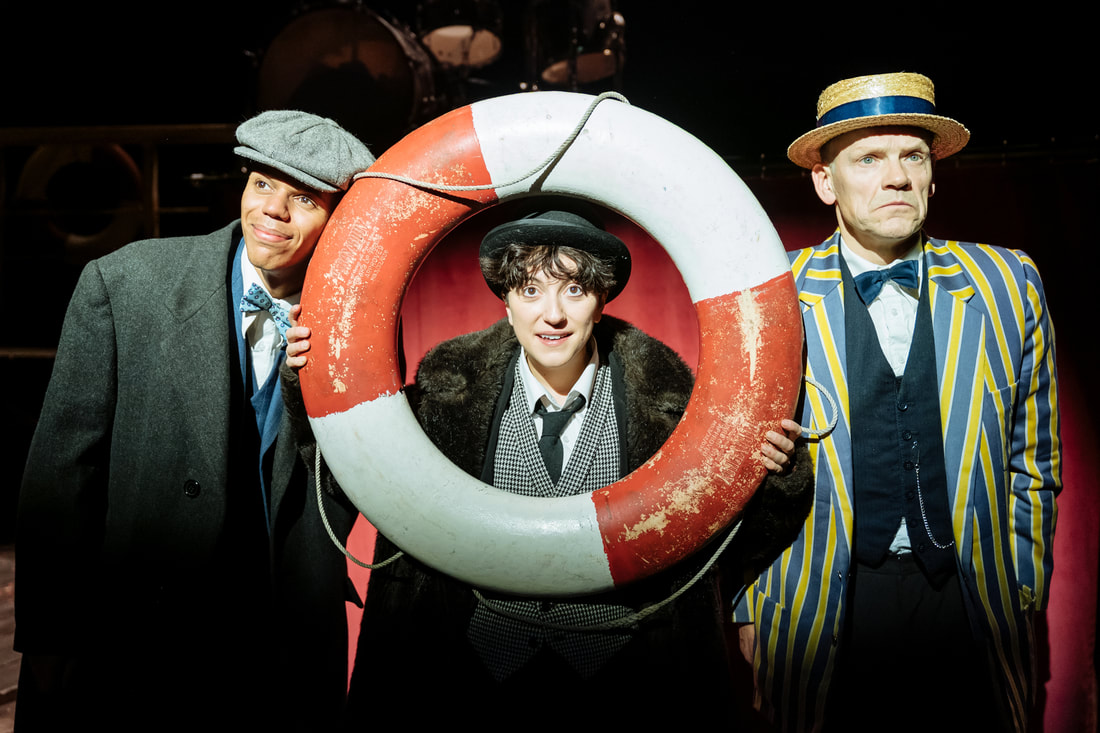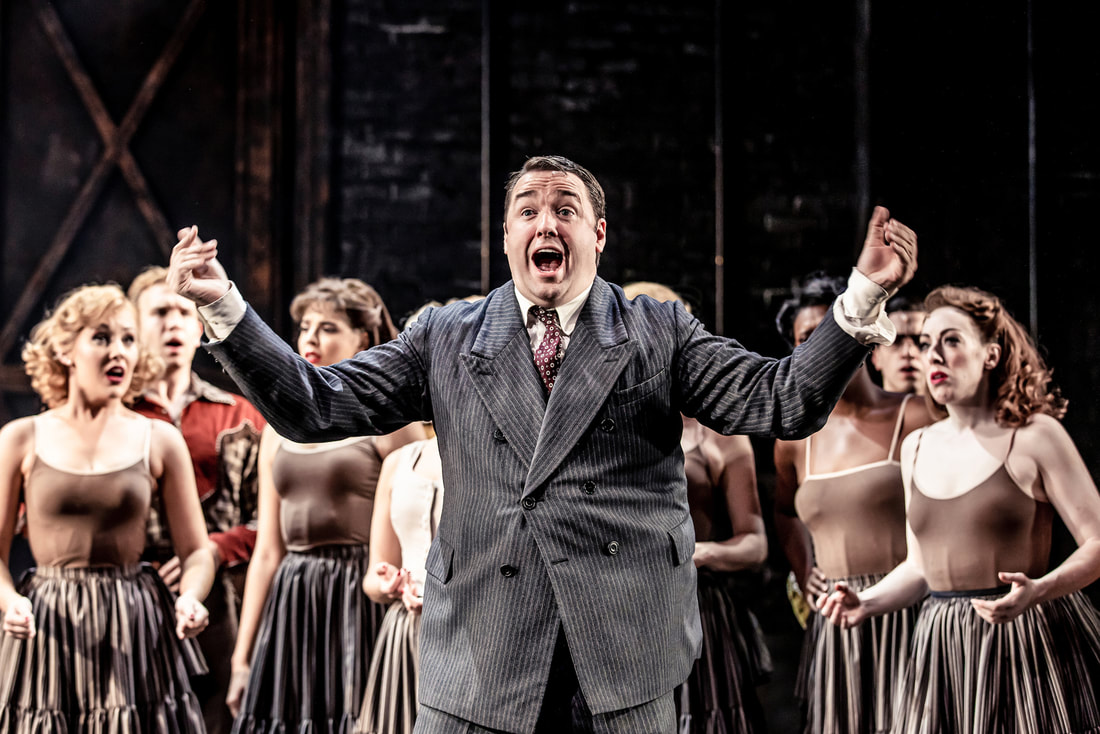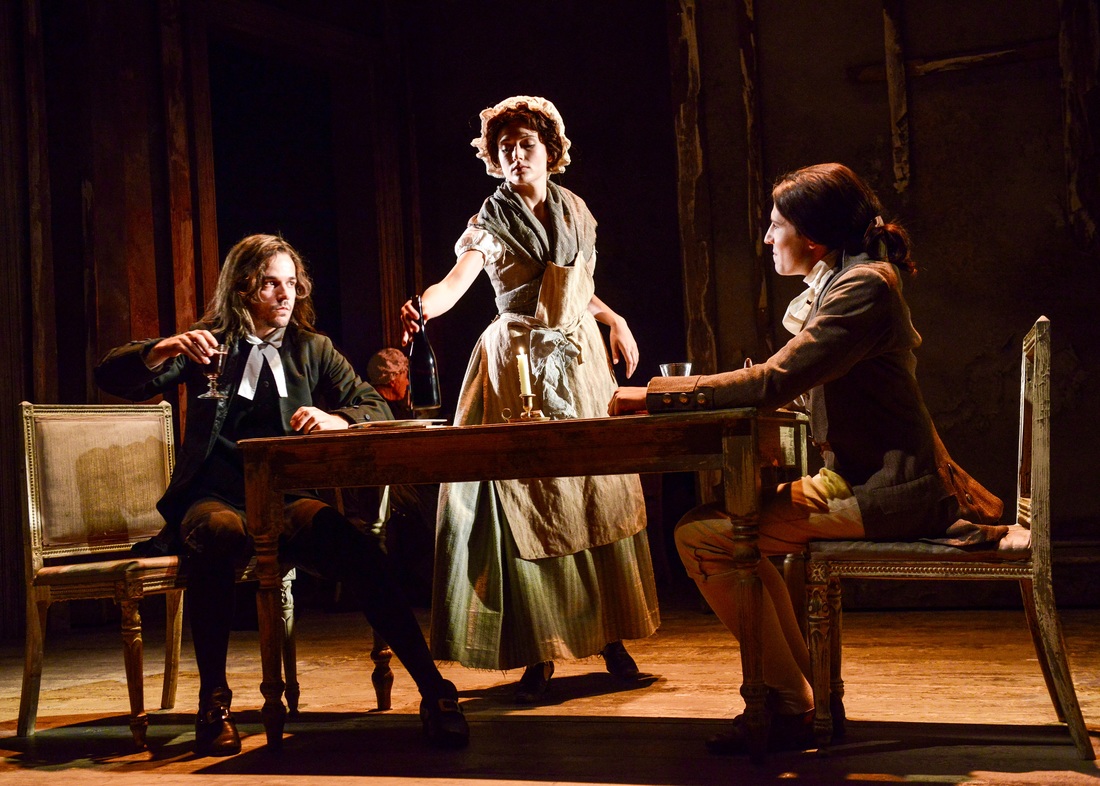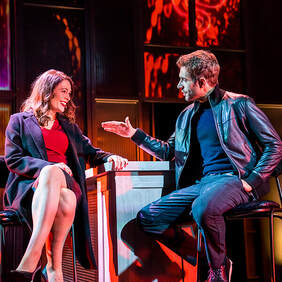 Susie Amy and Oliver Farnworth experience a Fatal Attraction. Photo by Tristram Kenton.
Susie Amy and Oliver Farnworth experience a Fatal Attraction. Photo by Tristram Kenton.
FATAL ATTRACTION
March 29, 2022
Derngate, Northampton, until Saturday, April 2, 2022, then tour continues
Film and theatre are two different things. And while the two can be combined very successfully, as we saw during lockdown, the adaptation of a story from one medium to another can present a whole raft of difficulties.
For the most part, Fatal Attraction overcomes the biggest pitfalls. Part of this may be down to the fact that its stage script has been crafted by the man who wrote the original screenplay – and, indeed, the short film from which it was developed – James Dearden. His familiarity with the characters and their motivations is evident in the clarity with which they are drawn.
Less sure-footed is the handling of those iconic elements of the movie which scream out to be the most dramatic moments on stage: how, for example, do you recreate the steamy sex scenes that generated much of the hype around Michael Douglas and Glenn Close’s on-screen relationship? Or the terrifying finale that gave the film twist after twist in an uncompromisingly cinematic way?
The answer is that you don’t. Oliver Farnworth and Susie Amy both do a great job as family man Dan Gallagher and the one-night fling turned stalker Alex Forrest, but the chemistry is hard to generate in a cavernous auditorium, and their intimacy has to be inferred more than evidenced. Louise Redknapp plays a strong supporting role as Dan’s trusting wife Beth, and all three of the central characters range capably through the gamut of emotions.
And there are two more secret weapons that this tour has up its sleeve, accentuating the thrills and making it a thoroughly theatrical experience. Paul Englishby’s beautifully judged music borrows heavily from cinema to underscore the drama, while Morgan Large’s set design proves both versatile and integral to the action. Split across two levels, with furniture wheeling unobtrusively in and out, it manages to represent a flashy New York apartment, a chic bar and a home in the country with simplicity and authenticity.
Under the secure directorial hand of Loveday Ingram, Fatal Attraction is not the 1987 film dropped onto a stage – Dearden takes liberties with his ending, for one thing, which may divide audiences. But it is an entertaining thrill ride with some excellent performances at its heart, and a striking piece of theatre in its own right.
March 29, 2022
Derngate, Northampton, until Saturday, April 2, 2022, then tour continues
Film and theatre are two different things. And while the two can be combined very successfully, as we saw during lockdown, the adaptation of a story from one medium to another can present a whole raft of difficulties.
For the most part, Fatal Attraction overcomes the biggest pitfalls. Part of this may be down to the fact that its stage script has been crafted by the man who wrote the original screenplay – and, indeed, the short film from which it was developed – James Dearden. His familiarity with the characters and their motivations is evident in the clarity with which they are drawn.
Less sure-footed is the handling of those iconic elements of the movie which scream out to be the most dramatic moments on stage: how, for example, do you recreate the steamy sex scenes that generated much of the hype around Michael Douglas and Glenn Close’s on-screen relationship? Or the terrifying finale that gave the film twist after twist in an uncompromisingly cinematic way?
The answer is that you don’t. Oliver Farnworth and Susie Amy both do a great job as family man Dan Gallagher and the one-night fling turned stalker Alex Forrest, but the chemistry is hard to generate in a cavernous auditorium, and their intimacy has to be inferred more than evidenced. Louise Redknapp plays a strong supporting role as Dan’s trusting wife Beth, and all three of the central characters range capably through the gamut of emotions.
And there are two more secret weapons that this tour has up its sleeve, accentuating the thrills and making it a thoroughly theatrical experience. Paul Englishby’s beautifully judged music borrows heavily from cinema to underscore the drama, while Morgan Large’s set design proves both versatile and integral to the action. Split across two levels, with furniture wheeling unobtrusively in and out, it manages to represent a flashy New York apartment, a chic bar and a home in the country with simplicity and authenticity.
Under the secure directorial hand of Loveday Ingram, Fatal Attraction is not the 1987 film dropped onto a stage – Dearden takes liberties with his ending, for one thing, which may divide audiences. But it is an entertaining thrill ride with some excellent performances at its heart, and a striking piece of theatre in its own right.
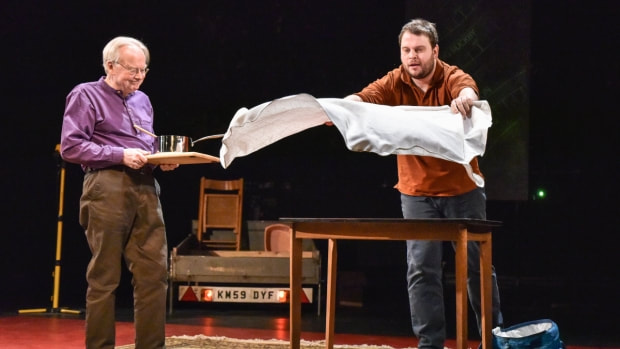 David Owen Norris and Barney Norris in The Wellspring. Photo by Robert Day.
David Owen Norris and Barney Norris in The Wellspring. Photo by Robert Day.
THE WELLSPRING
March 24, 2022
Royal Theatre, Northampton, until Saturday, March 26, 2022, then touring
The autobiographical drama from the father-son duo of Barney and David Owen Norris.
For Michael Davies's full review, visit whatsonstage.com.
March 24, 2022
Royal Theatre, Northampton, until Saturday, March 26, 2022, then touring
The autobiographical drama from the father-son duo of Barney and David Owen Norris.
For Michael Davies's full review, visit whatsonstage.com.
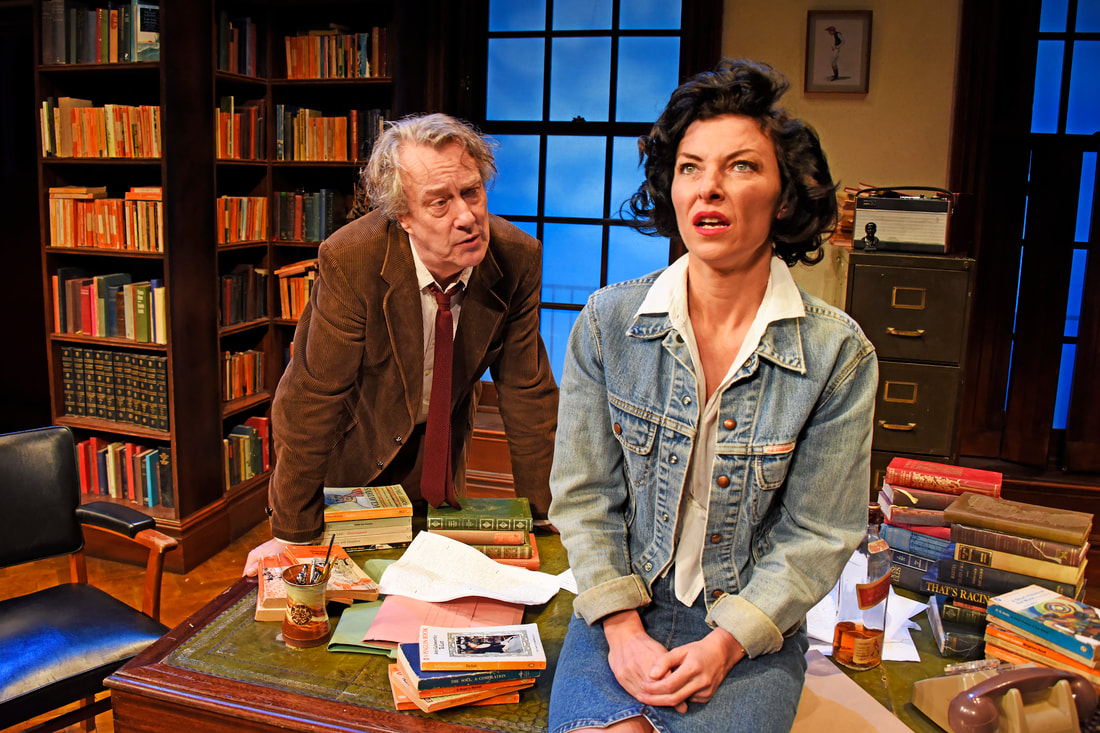 Stephen Tompkinson as Frank and Jessica Johnson as Rita. Photo by Nobby Clark.
Stephen Tompkinson as Frank and Jessica Johnson as Rita. Photo by Nobby Clark.
EDUCATING RITA
July 28, 2021
Derngate, Northampton, until Saturday, July 31, 2021, then tour continues
It’s hard to believe that Willy Russell’s two-hander extolling the virtues of education for all is 40 years old. Of course, being Willy Russell, it doesn’t just deliver a socialist polemic; no, it’s far more graceful than that. And even as it approaches middle age, this smart, sassy, sensitive play remains as powerful and persuasive as it ever did.
Rita, the Scouse hairdresser with self-motivated notions of bettering herself, seeks out Frank, an ageing, drunken erstwhile poet now washed up on the shores of academia teaching English literature to students who would rather be anywhere else than in his lectures. She starts out thinking she needs him: as the duologues unfold, it becomes increasingly apparent which of the pair is stronger, saner and more resilient.
Stephen Tompkinson is known best for his huge variety of television roles, but he’s able to hold a cavernous auditorium like the Derngate with equal charm. With shoulder-length hair and a bushy moustache, his Frank is a 1980s Don Quixote raging at the world for being left behind and silently at himself for allowing it to happen. He may overplay the double-takes on occasion, but he’s an assured presence and always watchable as the disintegrating father figure.
Jessica Johnson has a tougher time as the eponymous heroine. With the shadow of Julie Walters’s film incarnation never far away, she veers in and out of the accent rather too waywardly to stay fully engaged – which is a shame, as she nails the emotional heart of the piece and sparks well off Tompkinson, subtly and unconsciously turning the tables so that by the time she’s sitting at his desk and he’s in her subservient chair, it’s happened almost without us noticing.
Directed by Max Roberts, the production looks handsome. It features a beautifully designed set and some appropriately dodgy costumes by Patrick Connellan, bringing just the right hint of seediness to Frank’s study and some outlandish 80s fashion to Rita’s outfits. But it’s much more than a museum piece: Russell’s writing has aged like a vintage wine, and revisiting this landmark play feels as fresh as it did all those years ago.
July 28, 2021
Derngate, Northampton, until Saturday, July 31, 2021, then tour continues
It’s hard to believe that Willy Russell’s two-hander extolling the virtues of education for all is 40 years old. Of course, being Willy Russell, it doesn’t just deliver a socialist polemic; no, it’s far more graceful than that. And even as it approaches middle age, this smart, sassy, sensitive play remains as powerful and persuasive as it ever did.
Rita, the Scouse hairdresser with self-motivated notions of bettering herself, seeks out Frank, an ageing, drunken erstwhile poet now washed up on the shores of academia teaching English literature to students who would rather be anywhere else than in his lectures. She starts out thinking she needs him: as the duologues unfold, it becomes increasingly apparent which of the pair is stronger, saner and more resilient.
Stephen Tompkinson is known best for his huge variety of television roles, but he’s able to hold a cavernous auditorium like the Derngate with equal charm. With shoulder-length hair and a bushy moustache, his Frank is a 1980s Don Quixote raging at the world for being left behind and silently at himself for allowing it to happen. He may overplay the double-takes on occasion, but he’s an assured presence and always watchable as the disintegrating father figure.
Jessica Johnson has a tougher time as the eponymous heroine. With the shadow of Julie Walters’s film incarnation never far away, she veers in and out of the accent rather too waywardly to stay fully engaged – which is a shame, as she nails the emotional heart of the piece and sparks well off Tompkinson, subtly and unconsciously turning the tables so that by the time she’s sitting at his desk and he’s in her subservient chair, it’s happened almost without us noticing.
Directed by Max Roberts, the production looks handsome. It features a beautifully designed set and some appropriately dodgy costumes by Patrick Connellan, bringing just the right hint of seediness to Frank’s study and some outlandish 80s fashion to Rita’s outfits. But it’s much more than a museum piece: Russell’s writing has aged like a vintage wine, and revisiting this landmark play feels as fresh as it did all those years ago.
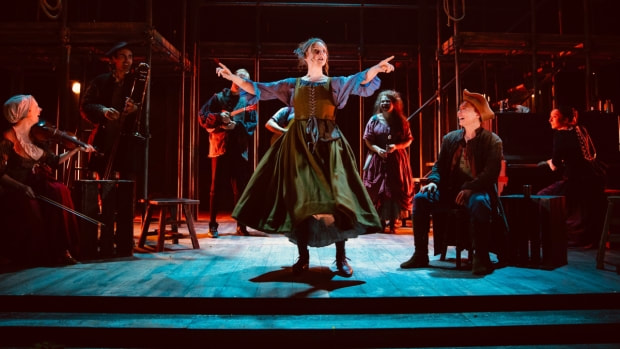 The team of actor-musicians in new musical Gin Craze! Photo by Ellie Kurttz.
The team of actor-musicians in new musical Gin Craze! Photo by Ellie Kurttz.
GIN CRAZE!
July 21, 2021
Royal Theatre, Northampton, until Saturday, July 31, 2021
A new musical about the historical fad that struck London in the 1700s, brought to life in a bawdy, brash production by a squad of actor-musicians.
For Michael Davies's full review, visit whatsonstage.com.
July 21, 2021
Royal Theatre, Northampton, until Saturday, July 31, 2021
A new musical about the historical fad that struck London in the 1700s, brought to life in a bawdy, brash production by a squad of actor-musicians.
For Michael Davies's full review, visit whatsonstage.com.
FOUR QUARTETS
June 9, 2021
Royal Theatre, Northampton, until Saturday, June 12, 2021, then tour continues
Privileged as I was to have interviewed Ralph Fiennes ahead of his first UK tour in this performance of TS Eliot’s wartime epic poems, it did feel as if there was a special pathway into the thought process behind the production.
Fiennes told me of his eagerness to make the poems feel conversational, engaging easily with the audience and avoiding the overly dramatic requirements of a large auditorium. So how far has he succeeded?
In terms of his ambition to engage, the simple reality is that he knocks it out of the park. He’s on stage, alone, for the best part of 80 minutes, with nothing but two monoliths of rotating wall, a couple of chairs and a table for company. The pace never for a moment falters.
Eliot’s meditations on the meaning of time, words, spirituality and meaning itself are redolent of an abstract impressionist in the art world. The four poems are thoughtful and slightly anxious in tone; that Fiennes performs them thoughtfully and slightly anxiously merely enhances their impact.
The project began as an exercise in keeping himself busy during lockdown: could he commit the vast text to memory? What developed, and here emerges as a fully-crafted theatre production, is a tour de force, not only of recollection but also of acting prowess. Here is a performer at the height of his powers, thoroughly working and exploring the subtleties of one of the 20th century’s great works, and revealing his workings willingly to the audience.
The result is neither recitation nor showing off: Fiennes’s directorial instinct – with, I suspect, some input from the Royal & Derngate’s artistic director James Dacre, here billed as creative producer – keeps him firmly rooted in the understated, the mellow, the musical.
Judicious costume and set design from Hildegard Bechtler, complementary lighting by Tim Lutkin and nuanced sound design by Christopher Shutt all add their important contributions, creating a visual and aural world fully in keeping with Fiennes’s simple, classy staging.
More than 40 years ago, Alec McCowen brought his solo rendition of St Mark’s Gospel to this same theatre, aweing those of us lucky enough to see it. I have a feeling that the small, Covid-reduced audience for Four Quartets may have the same feeling about it in another 40 years’ time… if we’re still around to gloat about it.
June 9, 2021
Royal Theatre, Northampton, until Saturday, June 12, 2021, then tour continues
Privileged as I was to have interviewed Ralph Fiennes ahead of his first UK tour in this performance of TS Eliot’s wartime epic poems, it did feel as if there was a special pathway into the thought process behind the production.
Fiennes told me of his eagerness to make the poems feel conversational, engaging easily with the audience and avoiding the overly dramatic requirements of a large auditorium. So how far has he succeeded?
In terms of his ambition to engage, the simple reality is that he knocks it out of the park. He’s on stage, alone, for the best part of 80 minutes, with nothing but two monoliths of rotating wall, a couple of chairs and a table for company. The pace never for a moment falters.
Eliot’s meditations on the meaning of time, words, spirituality and meaning itself are redolent of an abstract impressionist in the art world. The four poems are thoughtful and slightly anxious in tone; that Fiennes performs them thoughtfully and slightly anxiously merely enhances their impact.
The project began as an exercise in keeping himself busy during lockdown: could he commit the vast text to memory? What developed, and here emerges as a fully-crafted theatre production, is a tour de force, not only of recollection but also of acting prowess. Here is a performer at the height of his powers, thoroughly working and exploring the subtleties of one of the 20th century’s great works, and revealing his workings willingly to the audience.
The result is neither recitation nor showing off: Fiennes’s directorial instinct – with, I suspect, some input from the Royal & Derngate’s artistic director James Dacre, here billed as creative producer – keeps him firmly rooted in the understated, the mellow, the musical.
Judicious costume and set design from Hildegard Bechtler, complementary lighting by Tim Lutkin and nuanced sound design by Christopher Shutt all add their important contributions, creating a visual and aural world fully in keeping with Fiennes’s simple, classy staging.
More than 40 years ago, Alec McCowen brought his solo rendition of St Mark’s Gospel to this same theatre, aweing those of us lucky enough to see it. I have a feeling that the small, Covid-reduced audience for Four Quartets may have the same feeling about it in another 40 years’ time… if we’re still around to gloat about it.
THE STRANGE TALE OF CHARLIE CHAPLIN AND STAN LAUREL
* * * *
March 13, 2020
Royal & Derngate, Northampton, until Saturday, March 21, then tour continues
EARLY in their respective careers, Stan Laurel and Charlie Chaplin travelled to America together as part of Fred Karno’s touring music hall company. Charlie was the leading man and Stan technically his understudy, but they were both on the way to being the most famous clowns of the silent movie era. In subsequent years, Stan would talk frequently about Charlie. In Chaplin’s detailed autobiography, Laurel is not mentioned once.
This intriguing nugget is the cornerstone for Told by an Idiot’s charming, funny and impressive touring show, which uses that transatlantic crossing as its narrative thread. Writer and director Paul Hunter moves forward and backward in time, employing Ioana Curelea’s superbly inventive, multi-level set to revisit Charlie’s bleak Victorian childhood or Stan’s later partnership with Hardy.
But the real genius of this show is in the decision to perform it (largely) as a silent movie itself. Exploiting the versatile skills of its four performers to the maximum, it tells its tale brilliantly without a word being spoken. There are one or two vaudeville songs thrown in, perhaps a little superfluously, but otherwise this is a tour de force of visual comedy, virtuoso physical performance and some nifty endurance piano-playing.
Amalia Vitale is Chaplin, and never for a moment do you wonder why a female performer is playing the role. Her movements, reactions, facial expressions and timing are often uncanny and she anchors the show beautifully. Jerone Marsh-Reid’s Laurel may be less resonant physically, but he’s no less capable of getting a laugh from a look or mining a moment for optimum effect, and the pair work wonderfully together to explore what might be going on behind the clown masks.
Nick Haverson supplies a vast range of supplementary characters – including Oliver Hardy – and is also a deft hand at the on-stage drum kit, finding humour in a well-timed cymbal crash. And pianist-performer Sara Alexander is nothing less than the engine room of the whole show, keeping its delightful score (Zoe Rahman) constantly interesting and supportive, while not averse to throwing in a few instances of comedy gold herself.
There are sight gags, silent movie-style captions, even a little gentle audience participation, and at its heart a fascinating story told with wit and insight. We may never know the truth of the complexities between Stan and Charlie, but this is a fine tribute to their gigantic talents.
* * * *
March 13, 2020
Royal & Derngate, Northampton, until Saturday, March 21, then tour continues
EARLY in their respective careers, Stan Laurel and Charlie Chaplin travelled to America together as part of Fred Karno’s touring music hall company. Charlie was the leading man and Stan technically his understudy, but they were both on the way to being the most famous clowns of the silent movie era. In subsequent years, Stan would talk frequently about Charlie. In Chaplin’s detailed autobiography, Laurel is not mentioned once.
This intriguing nugget is the cornerstone for Told by an Idiot’s charming, funny and impressive touring show, which uses that transatlantic crossing as its narrative thread. Writer and director Paul Hunter moves forward and backward in time, employing Ioana Curelea’s superbly inventive, multi-level set to revisit Charlie’s bleak Victorian childhood or Stan’s later partnership with Hardy.
But the real genius of this show is in the decision to perform it (largely) as a silent movie itself. Exploiting the versatile skills of its four performers to the maximum, it tells its tale brilliantly without a word being spoken. There are one or two vaudeville songs thrown in, perhaps a little superfluously, but otherwise this is a tour de force of visual comedy, virtuoso physical performance and some nifty endurance piano-playing.
Amalia Vitale is Chaplin, and never for a moment do you wonder why a female performer is playing the role. Her movements, reactions, facial expressions and timing are often uncanny and she anchors the show beautifully. Jerone Marsh-Reid’s Laurel may be less resonant physically, but he’s no less capable of getting a laugh from a look or mining a moment for optimum effect, and the pair work wonderfully together to explore what might be going on behind the clown masks.
Nick Haverson supplies a vast range of supplementary characters – including Oliver Hardy – and is also a deft hand at the on-stage drum kit, finding humour in a well-timed cymbal crash. And pianist-performer Sara Alexander is nothing less than the engine room of the whole show, keeping its delightful score (Zoe Rahman) constantly interesting and supportive, while not averse to throwing in a few instances of comedy gold herself.
There are sight gags, silent movie-style captions, even a little gentle audience participation, and at its heart a fascinating story told with wit and insight. We may never know the truth of the complexities between Stan and Charlie, but this is a fine tribute to their gigantic talents.
CURTAINS
* * *
February 25, 2020
Royal & Derngate, Northampton, until Saturday, February 29, then tour continues
KANDER and Ebb were the masters of the classy, dark, subversive musical. Cabaret had as its backdrop the decadent years of Weimar Germany, Chicago the gangster-driven world of the 1930s Windy City.
Curtains, by contrast, is a thoroughly light-hearted, even fluffy piece of whimsy poking gentle fun at the world of potboiler pulp fiction and murder mysteries. It was the last score the pair worked on together before Fred Ebb’s death in 2004. I suspect he’d rather be remembered for the aforementioned smash hits.
That said, there’s nothing whatsoever wrong with it as a straight-down-the-line musical entertainment, neither too taxing nor too memorable. It has a quaintly old-fashioned feel to it, some jaunty production numbers and a smartly witty book by Rupert Holmes that twists and turns with a gleeful glint.
This new touring production has a couple of star names among its cast list. Recently revealed Masked Singer Jason Manford plays Lieutenant Frank Cioffi, a musicals-loving detective assigned to solve the spate of murders that afflicts the company of a new show trying out in Boston. Smitten by one of the understudies, he’s constantly torn between identifying the culprit and helping the director iron out the creases in the script. We already know from the television competition that Manford has a fine singing voice: here his warm personality pervades the narrative with equal charm.
The other ‘stunt’ casting – although it can hardly be called that, given the highly accomplished performance – is that of Ore Oduba, sometime Strictly contestant and here playing the composer of the show within a show. He too reveals a beautifully lyrical tenor and more than holds his own on the acting front.
Carley Stenson is on great form as his songwriting partner Georgia, who steps up to leading lady status when the previous incumbent is irredeemably incapacitated, while Rebecca Lock as a terrifying producer and Samuel Holmes as the wonderfully effete English director both turn in show-stealing performances.
The actual director Paul Foster and his choreographer Alistair David could have taken the pedal off the pace a little – every beat of every number is accompanied by frenetic moves and overwhelming activity – but the overall effect, while exhausting, is full of fun and has its tongue firmly in its cheek.
It may not be a showstopper, but neither is it curtains for Curtains.
* * *
February 25, 2020
Royal & Derngate, Northampton, until Saturday, February 29, then tour continues
KANDER and Ebb were the masters of the classy, dark, subversive musical. Cabaret had as its backdrop the decadent years of Weimar Germany, Chicago the gangster-driven world of the 1930s Windy City.
Curtains, by contrast, is a thoroughly light-hearted, even fluffy piece of whimsy poking gentle fun at the world of potboiler pulp fiction and murder mysteries. It was the last score the pair worked on together before Fred Ebb’s death in 2004. I suspect he’d rather be remembered for the aforementioned smash hits.
That said, there’s nothing whatsoever wrong with it as a straight-down-the-line musical entertainment, neither too taxing nor too memorable. It has a quaintly old-fashioned feel to it, some jaunty production numbers and a smartly witty book by Rupert Holmes that twists and turns with a gleeful glint.
This new touring production has a couple of star names among its cast list. Recently revealed Masked Singer Jason Manford plays Lieutenant Frank Cioffi, a musicals-loving detective assigned to solve the spate of murders that afflicts the company of a new show trying out in Boston. Smitten by one of the understudies, he’s constantly torn between identifying the culprit and helping the director iron out the creases in the script. We already know from the television competition that Manford has a fine singing voice: here his warm personality pervades the narrative with equal charm.
The other ‘stunt’ casting – although it can hardly be called that, given the highly accomplished performance – is that of Ore Oduba, sometime Strictly contestant and here playing the composer of the show within a show. He too reveals a beautifully lyrical tenor and more than holds his own on the acting front.
Carley Stenson is on great form as his songwriting partner Georgia, who steps up to leading lady status when the previous incumbent is irredeemably incapacitated, while Rebecca Lock as a terrifying producer and Samuel Holmes as the wonderfully effete English director both turn in show-stealing performances.
The actual director Paul Foster and his choreographer Alistair David could have taken the pedal off the pace a little – every beat of every number is accompanied by frenetic moves and overwhelming activity – but the overall effect, while exhausting, is full of fun and has its tongue firmly in its cheek.
It may not be a showstopper, but neither is it curtains for Curtains.
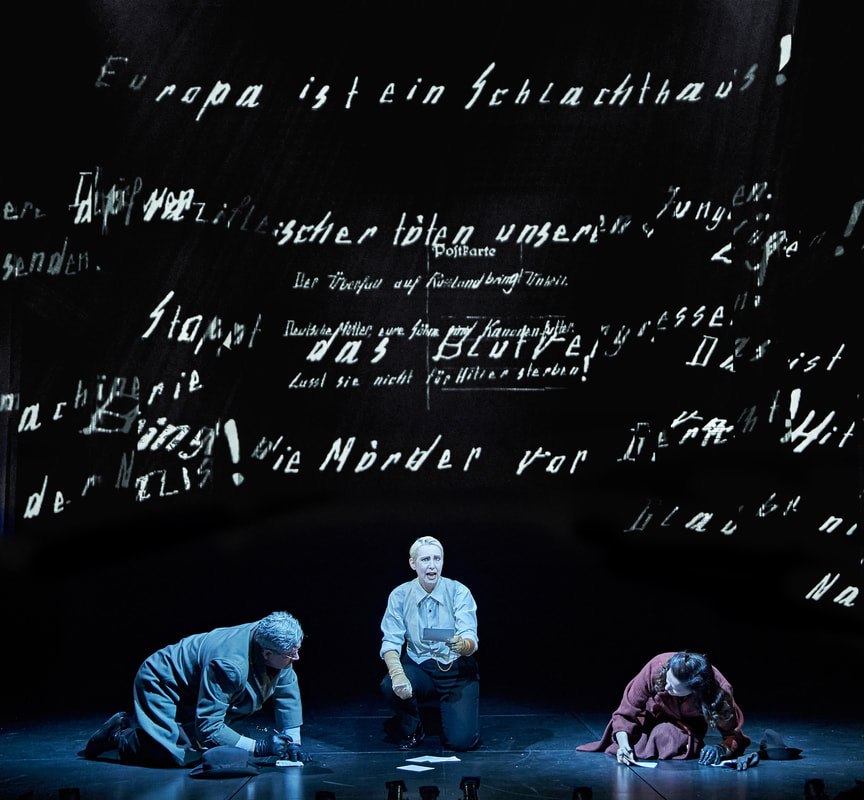 Denis Conway, Jessica Walker and Charlotte Emmerson in Alone in Berlin. Photo by Manuel Harlan.
Denis Conway, Jessica Walker and Charlotte Emmerson in Alone in Berlin. Photo by Manuel Harlan.
ALONE IN BERLIN
* *
February 12, 2020
Royal Theatre, Northampton, until Saturday, February 29, 2020
This stage adaptation of Hans Fallada’s novel set in pre-war Germany fails to grip with the resonant terror of fascism on the rise.
For Michael Davies’s full review, visit whatsonstage.com
* *
February 12, 2020
Royal Theatre, Northampton, until Saturday, February 29, 2020
This stage adaptation of Hans Fallada’s novel set in pre-war Germany fails to grip with the resonant terror of fascism on the rise.
For Michael Davies’s full review, visit whatsonstage.com
 Andrew French as diner owner Memphis (left) and Derek Ezenagu as Hambone. Photo by Manuel Harlan.
Andrew French as diner owner Memphis (left) and Derek Ezenagu as Hambone. Photo by Manuel Harlan.
TWO TRAINS RUNNING
* * *
September 4, 2019
Royal Theatre, Northampton, until Saturday, September 14, 2019
August Wilson’s sixth play in The Pittsburgh cycle, putting the spotlight on a disintegrating community in 1969 America, gets a visually compelling outing at Royal & Derngate before a UK-wide tour.
For Michael Davies’s full review, visit whatsonstage.com
* * *
September 4, 2019
Royal Theatre, Northampton, until Saturday, September 14, 2019
August Wilson’s sixth play in The Pittsburgh cycle, putting the spotlight on a disintegrating community in 1969 America, gets a visually compelling outing at Royal & Derngate before a UK-wide tour.
For Michael Davies’s full review, visit whatsonstage.com
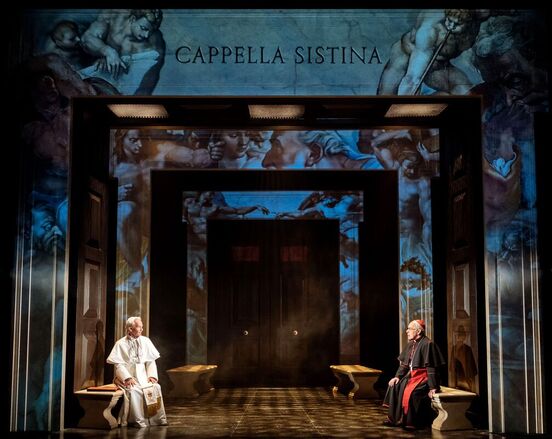 Anton Lesser and Nicholas Woodeson star in The Pope. Photo by Manuel Harlan.
Anton Lesser and Nicholas Woodeson star in The Pope. Photo by Manuel Harlan.
THE POPE
* * * *
June 12, 2019
Royal Theatre, Northampton, until Saturday, June 22, 2019
Anton Lesser and Nicholas Woodeson star in Anthony McCarten’s new play based on the abdication of Pope Benedict XVI.
For Michael Davies’s full review, visit whatsonstage.com
* * * *
June 12, 2019
Royal Theatre, Northampton, until Saturday, June 22, 2019
Anton Lesser and Nicholas Woodeson star in Anthony McCarten’s new play based on the abdication of Pope Benedict XVI.
For Michael Davies’s full review, visit whatsonstage.com
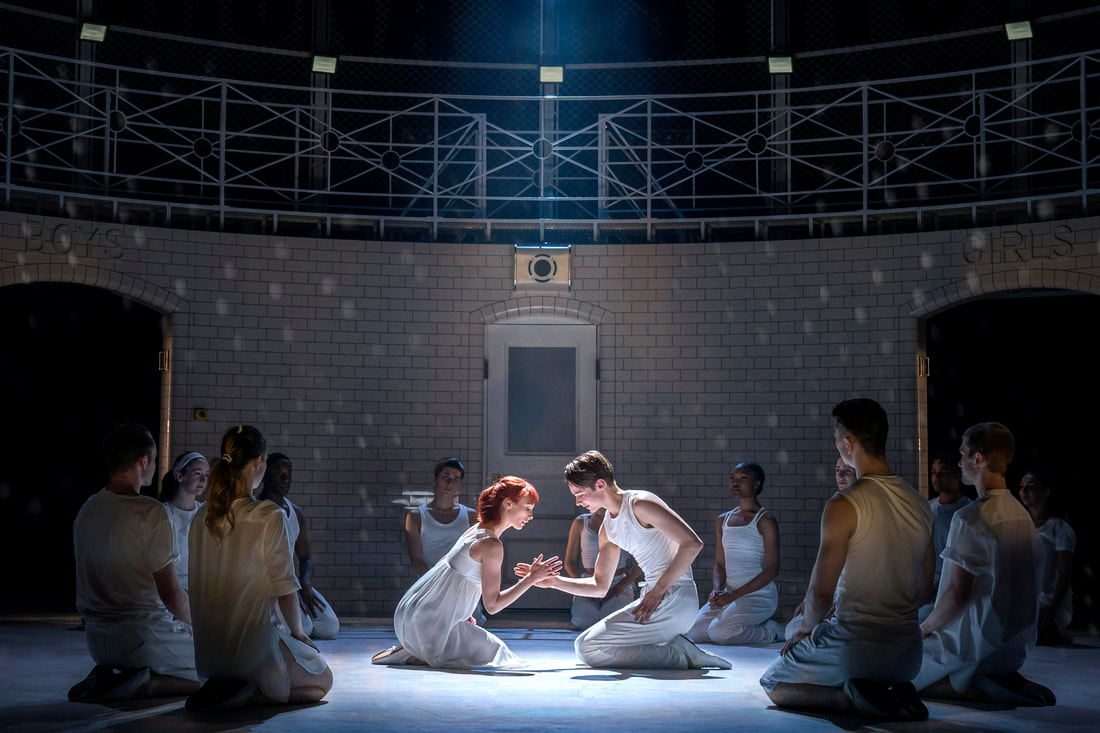 Star-cross'd: Cordelia Braithwaite and Paris Fitzpatrick as Juliet and Romeo. Photo by Johan Persson.
Star-cross'd: Cordelia Braithwaite and Paris Fitzpatrick as Juliet and Romeo. Photo by Johan Persson.
MATTHEW BOURNE’S ROMEO AND JULIET
* * * *
May 29, 2019
Derngate, Northampton, until Saturday, June 1, 2019, then tour continues
Sir Matthew Bourne, dancer, choreographer and director of groundbreaking dance company New Adventures, has never been one for tradition. He’s taken most of the major ballets in the international repertoire and given them a heavy-duty makeover. Whether it’s his all-male Swan Lake or his World War Two take on Cinderella, his roving eye is constantly looking for a new way to tell old stories.
For the company’s new show, his gaze has fallen on the dramatic Prokofiev score for the ballet Romeo and Juliet. One of the great dance scores of the 20th century, there’s certainly plenty for a director to get their teeth into, with teenage love, random acts of violence and tragedy high on the agenda.
In typical fashion, Bourne does the unexpected – in spades. Set in the near future, his backdrop is a terrifying, clinically sterile establishment (asylum? youth custody centre? psychiatric ward?) named the Verona Institute, where boys and girls are carefully segregated and the armed warders execute summary justice. Here, a troubled Romeo is brought by his celebrity parents, presumably to hide him away, and he meets fellow inmate Juliet, already a victim of the system’s abuses.
Inevitably, such a free hand involves some major liberties with the plot, and anyone familiar with Shakespeare’s version or any of its incarnations might struggle to make out the basic storyline among the welter of narrative changes. Indeed, Bourne might have been safer to call it something else entirely.
None of this alters the extraordinary power he has to tell a story, however, and this tale of star-cross’d lovers is both emotionally gripping and heartbreakingly dramatic, even if it’s only loosely inspired by Romeo and Juliet. For this new show, just three weeks old, Bourne has assembled an A-team of creatives and performers, but also drafted in a small army of younger dancers around the country, to introduce them to a truly professional experience and to expose audiences to the talent that is emerging. These 16 to 19-year-olds merge seamlessly with the company and are never less than a credit to the show and to Bourne’s far-sightedness.
Lez Brotherston’s white, fenced-in set looks amazing, with a sweeping, glossily-tiled back wall shaping and reflecting the fluidity of the movement on stage. There are nods to the famous balcony scene and smart transformations into everything from a disco ballroom to a morgue, all lit to perfection by Paule Constable. There’s also an intriguing new orchestration of Prokofiev’s score thanks to Terry Davies, who delivers plenty of heft and texture from his 15 musicians under the baton of Brett Morris.
Visually, Bourne’s touch is as sure as ever. The stage is constantly busy, constantly engaging, and every dancer’s focus is intense and unbroken throughout the two-hour narrative. Paris Fitzpatrick’s boyish, fiery Romeo is both fearful and bold, and the expressiveness he shares with Cordelia Braithwaite’s beautiful Juliet is tender and incredibly moving. There are endless imaginative ideas and the pacing is carefully judged, with elegiac solos and duets contrasting superbly with big production pieces.
It’s a spectacle as well as a feat of logistics, and another triumph for Bourne and his company. Your only expectation should be to be surprised.
* * * *
May 29, 2019
Derngate, Northampton, until Saturday, June 1, 2019, then tour continues
Sir Matthew Bourne, dancer, choreographer and director of groundbreaking dance company New Adventures, has never been one for tradition. He’s taken most of the major ballets in the international repertoire and given them a heavy-duty makeover. Whether it’s his all-male Swan Lake or his World War Two take on Cinderella, his roving eye is constantly looking for a new way to tell old stories.
For the company’s new show, his gaze has fallen on the dramatic Prokofiev score for the ballet Romeo and Juliet. One of the great dance scores of the 20th century, there’s certainly plenty for a director to get their teeth into, with teenage love, random acts of violence and tragedy high on the agenda.
In typical fashion, Bourne does the unexpected – in spades. Set in the near future, his backdrop is a terrifying, clinically sterile establishment (asylum? youth custody centre? psychiatric ward?) named the Verona Institute, where boys and girls are carefully segregated and the armed warders execute summary justice. Here, a troubled Romeo is brought by his celebrity parents, presumably to hide him away, and he meets fellow inmate Juliet, already a victim of the system’s abuses.
Inevitably, such a free hand involves some major liberties with the plot, and anyone familiar with Shakespeare’s version or any of its incarnations might struggle to make out the basic storyline among the welter of narrative changes. Indeed, Bourne might have been safer to call it something else entirely.
None of this alters the extraordinary power he has to tell a story, however, and this tale of star-cross’d lovers is both emotionally gripping and heartbreakingly dramatic, even if it’s only loosely inspired by Romeo and Juliet. For this new show, just three weeks old, Bourne has assembled an A-team of creatives and performers, but also drafted in a small army of younger dancers around the country, to introduce them to a truly professional experience and to expose audiences to the talent that is emerging. These 16 to 19-year-olds merge seamlessly with the company and are never less than a credit to the show and to Bourne’s far-sightedness.
Lez Brotherston’s white, fenced-in set looks amazing, with a sweeping, glossily-tiled back wall shaping and reflecting the fluidity of the movement on stage. There are nods to the famous balcony scene and smart transformations into everything from a disco ballroom to a morgue, all lit to perfection by Paule Constable. There’s also an intriguing new orchestration of Prokofiev’s score thanks to Terry Davies, who delivers plenty of heft and texture from his 15 musicians under the baton of Brett Morris.
Visually, Bourne’s touch is as sure as ever. The stage is constantly busy, constantly engaging, and every dancer’s focus is intense and unbroken throughout the two-hour narrative. Paris Fitzpatrick’s boyish, fiery Romeo is both fearful and bold, and the expressiveness he shares with Cordelia Braithwaite’s beautiful Juliet is tender and incredibly moving. There are endless imaginative ideas and the pacing is carefully judged, with elegiac solos and duets contrasting superbly with big production pieces.
It’s a spectacle as well as a feat of logistics, and another triumph for Bourne and his company. Your only expectation should be to be surprised.
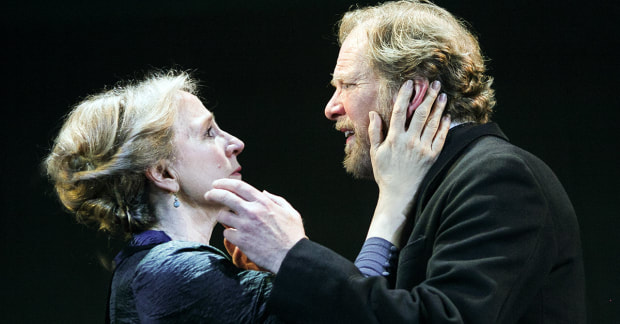 Gripping: Penny Downie and James Wilby star in Lucy Bailey's Ghosts. Photo by Sheila Burnett.
Gripping: Penny Downie and James Wilby star in Lucy Bailey's Ghosts. Photo by Sheila Burnett.
GHOSTS
* * * * *
April 24, 2019
Royal Theatre, Northampton, until Saturday, May 11, 2019
Penny Downie and James Wilby star in this powerful, pitch-perfect version of Ibsen’s dark play, adapted by Mike Poulton and directed by Lucy Bailey.
For Michael Davies’s full review, visit whatsonstage.com
* * * * *
April 24, 2019
Royal Theatre, Northampton, until Saturday, May 11, 2019
Penny Downie and James Wilby star in this powerful, pitch-perfect version of Ibsen’s dark play, adapted by Mike Poulton and directed by Lucy Bailey.
For Michael Davies’s full review, visit whatsonstage.com
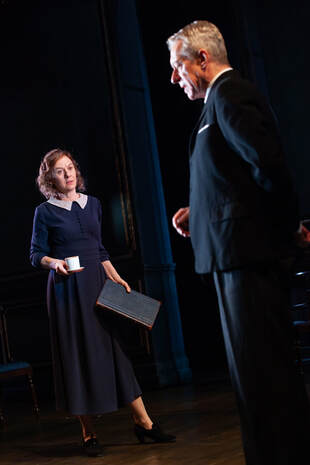 Niamh Cusack and Stephen Boxer star in The Remains of the Day. Photo by Iona Firouzabadi.
Niamh Cusack and Stephen Boxer star in The Remains of the Day. Photo by Iona Firouzabadi.
THE REMAINS OF THE DAY
* * * *
February 27, 2019
Royal Theatre, Northampton, until Saturday, March 16, 2019, then touring
Barney Norris adapts Kazuo Ishiguro's Booker prize-winning novel.
For Michael Davies’s full review, visit whatsonstage.com
* * * *
February 27, 2019
Royal Theatre, Northampton, until Saturday, March 16, 2019, then touring
Barney Norris adapts Kazuo Ishiguro's Booker prize-winning novel.
For Michael Davies’s full review, visit whatsonstage.com
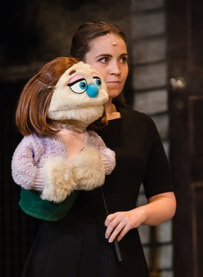 Adorable: Kate Monster with her handler Cecily Redman.
Adorable: Kate Monster with her handler Cecily Redman.
AVENUE Q
* * * *
February 18, 2019
Derngate, Northampton, until Saturday, February 23, 2019, then tour continues
The story of how this distorted, malformed Muppet Show came to life is worthy of a musical in itself. Two New York theatre workshop attendees who wanted to stage Hamlet with Kermit the Frog in the title role settled instead for a rude, lewd but highly affectionate tribute to the puppets of Jim Henson and, in the process, came up with a Broadway smash.
Avenue Q – see the similarities with Sesame Street already? – has been delighting, shocking and thoroughly entertaining audiences since 2002 with its pre-Book of Mormon cocktail of racism, sex and general offensiveness, all delivered by the indisputably lovable cloth creations of some master puppeteers.
The songs, by those two New Yorkers Jeff Marx and Robert Lopez (who incidentally went on to have a large hand in Mormon), are fiendishly catchy and singable, and coupled with the adorable puppet characters – each performed in plain sight by their human handlers – pack a real emotional punch ranging from farce to pathos.
Lawrence Smith and Cecily Redman do a large proportion of the heavy lifting, doubling the main characters Princeton, Rod, Kate Monster and Lucy the Slut, and they really earn their money. The individual characterisations are always clear, the comedy beautifully judged and the singing top-notch. There’s excellent support from the rest of the cast too, strongly buoyed by a six-piece live band under Dean McDermott who are occasionally a little too loud in the mix for the vocals to be heard.
Cressida Carre’s direction is sure-footed and lively, the whole cast delivering the infectious score and book (Jeff Whitty) with a mischievous twinkle in their eyes. And while Richard Evans’s simply effective design and Charlie Morgan Jones’s lighting will evoke plenty of Sesame Street memories in those of a certain age, it’s Paul Jomain’s puppets that really carry the show, utterly believable and completely engrossing to the point of virtually erasing their human counterparts.
If the musical is showing signs of age – it seems positively tame now in comparison with some of the younger upstarts – there’s still a lot of value to be had from its innate sense of fun and old-fashioned charm. Not that it doesn’t still have the power to shock: with song titles such as Everyone’s a Little Bit Racist and The Internet is for Porn, you can be sure of a raucous ride.
* * * *
February 18, 2019
Derngate, Northampton, until Saturday, February 23, 2019, then tour continues
The story of how this distorted, malformed Muppet Show came to life is worthy of a musical in itself. Two New York theatre workshop attendees who wanted to stage Hamlet with Kermit the Frog in the title role settled instead for a rude, lewd but highly affectionate tribute to the puppets of Jim Henson and, in the process, came up with a Broadway smash.
Avenue Q – see the similarities with Sesame Street already? – has been delighting, shocking and thoroughly entertaining audiences since 2002 with its pre-Book of Mormon cocktail of racism, sex and general offensiveness, all delivered by the indisputably lovable cloth creations of some master puppeteers.
The songs, by those two New Yorkers Jeff Marx and Robert Lopez (who incidentally went on to have a large hand in Mormon), are fiendishly catchy and singable, and coupled with the adorable puppet characters – each performed in plain sight by their human handlers – pack a real emotional punch ranging from farce to pathos.
Lawrence Smith and Cecily Redman do a large proportion of the heavy lifting, doubling the main characters Princeton, Rod, Kate Monster and Lucy the Slut, and they really earn their money. The individual characterisations are always clear, the comedy beautifully judged and the singing top-notch. There’s excellent support from the rest of the cast too, strongly buoyed by a six-piece live band under Dean McDermott who are occasionally a little too loud in the mix for the vocals to be heard.
Cressida Carre’s direction is sure-footed and lively, the whole cast delivering the infectious score and book (Jeff Whitty) with a mischievous twinkle in their eyes. And while Richard Evans’s simply effective design and Charlie Morgan Jones’s lighting will evoke plenty of Sesame Street memories in those of a certain age, it’s Paul Jomain’s puppets that really carry the show, utterly believable and completely engrossing to the point of virtually erasing their human counterparts.
If the musical is showing signs of age – it seems positively tame now in comparison with some of the younger upstarts – there’s still a lot of value to be had from its innate sense of fun and old-fashioned charm. Not that it doesn’t still have the power to shock: with song titles such as Everyone’s a Little Bit Racist and The Internet is for Porn, you can be sure of a raucous ride.
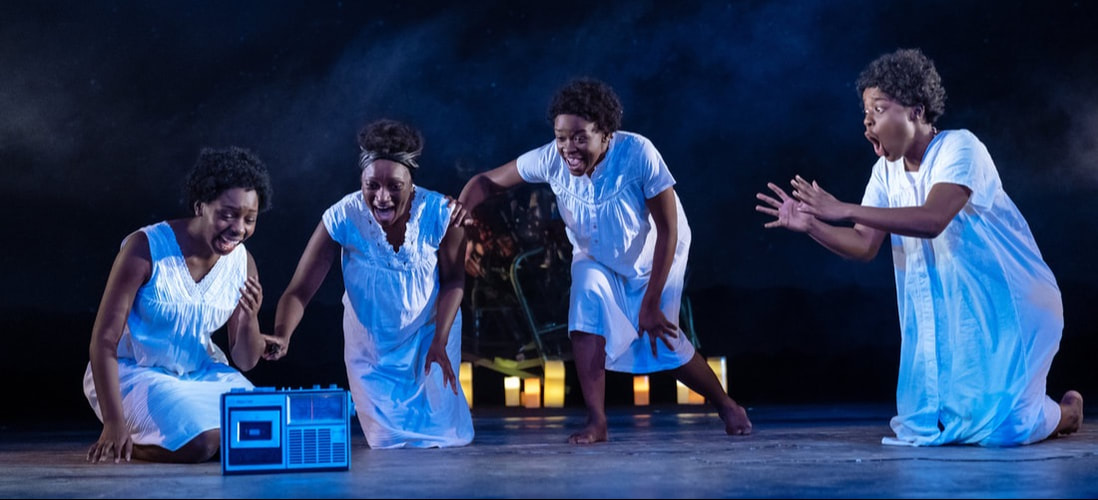 Real-life events sparked the dramatic story of Our Lady of Kibeho. Photo by Manuel Harlan.
Real-life events sparked the dramatic story of Our Lady of Kibeho. Photo by Manuel Harlan.
OUR LADY OF KIBEHO
* * * *
January 16, 2019
Royal Theatre, Northampton, until Saturday, February 2, 2019
Katori Hall’s play focuses on a real-life story of the Virgin Mary appearing to schoolgirls in Rwanda.
For Michael Davies’s full review, visit whatsonstage.com
* * * *
January 16, 2019
Royal Theatre, Northampton, until Saturday, February 2, 2019
Katori Hall’s play focuses on a real-life story of the Virgin Mary appearing to schoolgirls in Rwanda.
For Michael Davies’s full review, visit whatsonstage.com
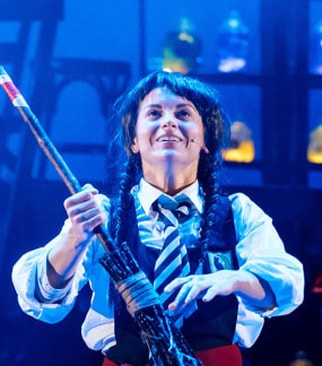 Danielle Bird as Mildred Hubble. Photo by Manuel Harlan.
Danielle Bird as Mildred Hubble. Photo by Manuel Harlan.
THE WORST WITCH
* * *
December 19, 2018
Royal Theatre, Northampton, until Sunday, December 30, 2018, then touring
Jill Murphy’s classic children’s book about Mildred Hubble is adapted for the stage.
For Michael Davies’s full review, visit whatsonstage.com
* * *
December 19, 2018
Royal Theatre, Northampton, until Sunday, December 30, 2018, then touring
Jill Murphy’s classic children’s book about Mildred Hubble is adapted for the stage.
For Michael Davies’s full review, visit whatsonstage.com
KINKY BOOTS
* * *
September 24, 2018
Derngate, Northampton, until Saturday, October 6, 2018, then tour continues
The hit musical adaptation of the classic film heads out on the road, starting off in the town where the story is set.
For Michael Davies’s full review, visit whatsonstage.com
* * *
September 24, 2018
Derngate, Northampton, until Saturday, October 6, 2018, then tour continues
The hit musical adaptation of the classic film heads out on the road, starting off in the town where the story is set.
For Michael Davies’s full review, visit whatsonstage.com
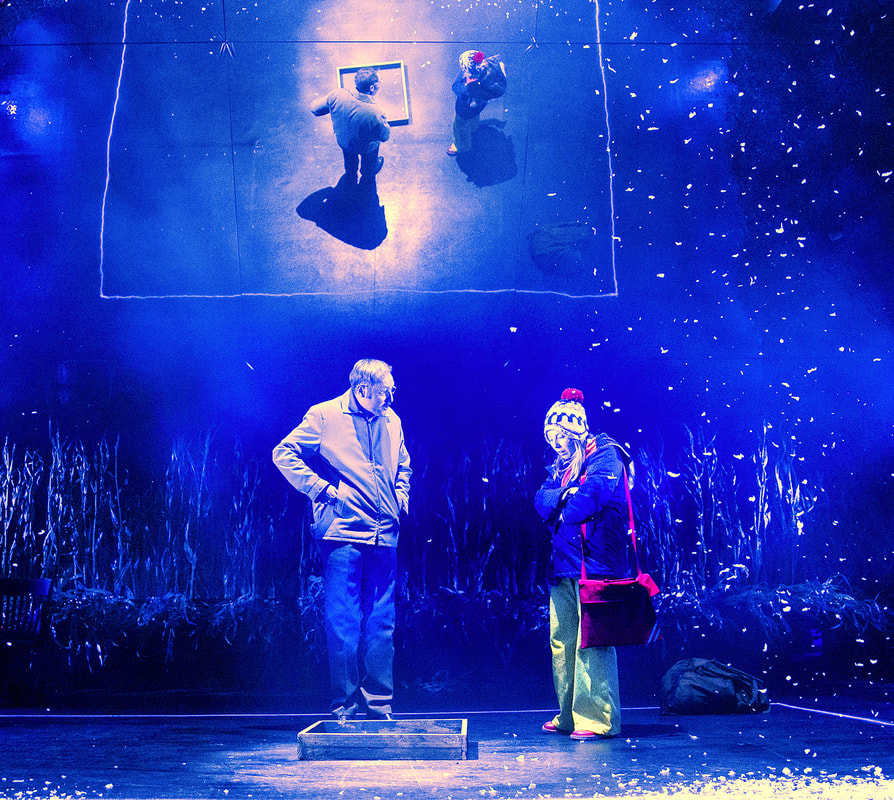 Not so lovely: Keith Dunphy and Charlotte Beaumont. Photo by Sheila Burnett.
Not so lovely: Keith Dunphy and Charlotte Beaumont. Photo by Sheila Burnett.
THE LOVELY BONES
* * * *
September 7, 2018
Royal Theatre, Northampton, until Saturday September 22, 2018, then touring until Saturday, November 18, 2018
The original book of The Lovely Bones won debut novelist Alice Sebold both critical and popular acclaim for its supernatural study of a murdered teenage girl looking back at her family from the afterlife. It was subsequently filmed to moderate success and is now being given its first stage adaptation courtesy of a quartet of theatre companies, who also host the forthcoming tour.
Whether the rape and murder of a 14-year-old in 1973 suburban America is really appropriate material for an evening’s entertainment could probably be debated. The horrific attack acts as the starting point for Sebold’s story, adapted episodically by Bryony Lavery, but there’s little sense of a whodunit (we know that answer from the outset) or even psychological thriller about the narrative: instead it seems intended to serve as a poignant meditation on the nature of loss, grief and moving on.
Unfortunately, for me, any such intended poignancy is missing, partly because of the play’s meandering, aimless narrative and partly because of the relentless grimness – there’s precious little in the way of light relief. However, where this production scores brilliantly is in the theatrical virtuosity of director Melly Still and her team.
Designed on a spectacularly ingenious set by Ana Ines Jabares-Pita, with a vast angled mirror reflecting the stage action back at us from above, Still delivers a cinematic perspective through clever use of props, lighting, levels and every theatre trick in the book. While occasionally there may be a sense of overloading the show with gimmickry, most of the time this stuff works superbly.
Matt Haskins lights the whole thing to perfection and there’s some atmospheric music and sound from Dave Price and Helen Skiera. But the real beating heart of this production is the tight, seamlessly integrated ensemble of 11 actors, playing a host of characters impeccably. At the centre of the action is a wonderful performance from Charlotte Beaumont, wide-eyed and completely believable as the teenage victim Susan, who wrestles with the confines of her personal heaven to get through to the family she has left behind.
Beaumont is far from alone in delivering a well-judged and carefully timed performance, with Emily Bevan and Jack Sandle particularly strong as her grieving parents. Indeed, the cast are uniformly excellent, with no weak links, and it’s their teamwork that impresses as much as the smoke and mirrors.
If you can suspend the mild distaste at the subject matter, this is a visual exercise in theatricality that pulls out all the stops.
* * * *
September 7, 2018
Royal Theatre, Northampton, until Saturday September 22, 2018, then touring until Saturday, November 18, 2018
The original book of The Lovely Bones won debut novelist Alice Sebold both critical and popular acclaim for its supernatural study of a murdered teenage girl looking back at her family from the afterlife. It was subsequently filmed to moderate success and is now being given its first stage adaptation courtesy of a quartet of theatre companies, who also host the forthcoming tour.
Whether the rape and murder of a 14-year-old in 1973 suburban America is really appropriate material for an evening’s entertainment could probably be debated. The horrific attack acts as the starting point for Sebold’s story, adapted episodically by Bryony Lavery, but there’s little sense of a whodunit (we know that answer from the outset) or even psychological thriller about the narrative: instead it seems intended to serve as a poignant meditation on the nature of loss, grief and moving on.
Unfortunately, for me, any such intended poignancy is missing, partly because of the play’s meandering, aimless narrative and partly because of the relentless grimness – there’s precious little in the way of light relief. However, where this production scores brilliantly is in the theatrical virtuosity of director Melly Still and her team.
Designed on a spectacularly ingenious set by Ana Ines Jabares-Pita, with a vast angled mirror reflecting the stage action back at us from above, Still delivers a cinematic perspective through clever use of props, lighting, levels and every theatre trick in the book. While occasionally there may be a sense of overloading the show with gimmickry, most of the time this stuff works superbly.
Matt Haskins lights the whole thing to perfection and there’s some atmospheric music and sound from Dave Price and Helen Skiera. But the real beating heart of this production is the tight, seamlessly integrated ensemble of 11 actors, playing a host of characters impeccably. At the centre of the action is a wonderful performance from Charlotte Beaumont, wide-eyed and completely believable as the teenage victim Susan, who wrestles with the confines of her personal heaven to get through to the family she has left behind.
Beaumont is far from alone in delivering a well-judged and carefully timed performance, with Emily Bevan and Jack Sandle particularly strong as her grieving parents. Indeed, the cast are uniformly excellent, with no weak links, and it’s their teamwork that impresses as much as the smoke and mirrors.
If you can suspend the mild distaste at the subject matter, this is a visual exercise in theatricality that pulls out all the stops.
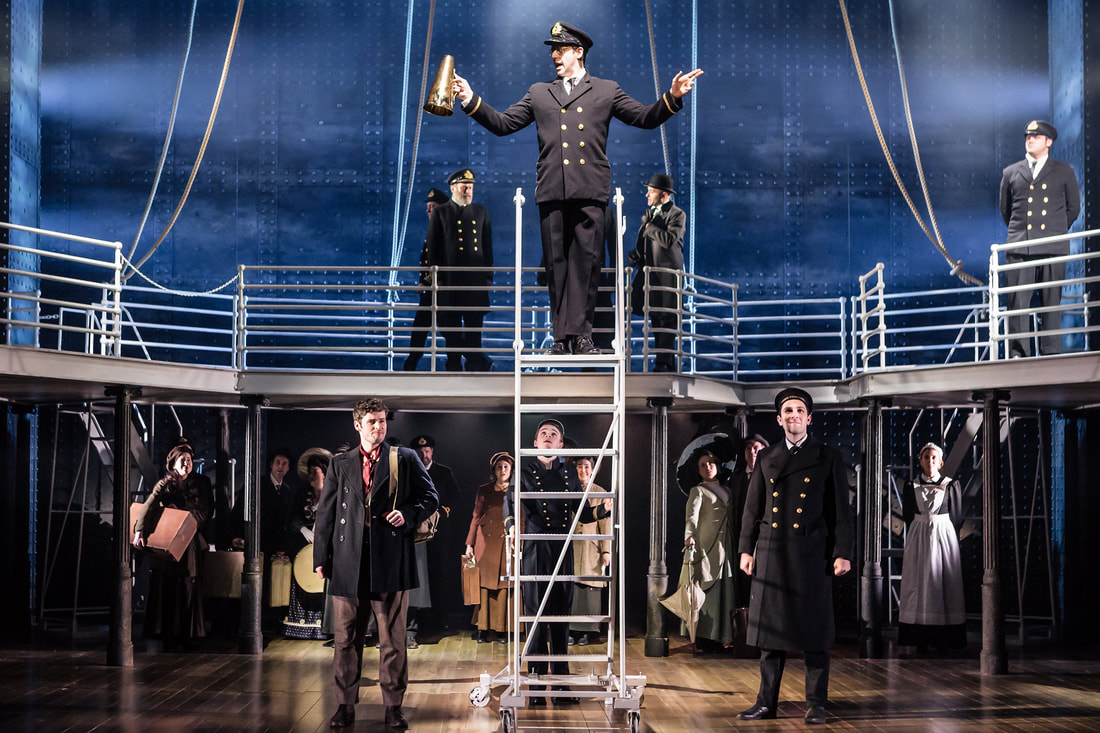 Epic: Titanic the Musical looks and sounds superb. Photo by Scott Rylander.
Epic: Titanic the Musical looks and sounds superb. Photo by Scott Rylander.
TITANIC
* * * *
June 29, 2018
Derngate, Northampton, until Saturday, June 30, 2018, then tour continues
This epic musical about the century-old shipping tragedy had its maiden voyage at London’s Southwark Playhouse nearly five years ago. It was revived at Charing Cross Theatre in 2016, where its huge critical and popular success justly earned it a tour of the UK.
Its current berth is in Northampton, where the scale and impressive grandeur of the production are displayed to great effect. Maury Yeston’s majestic score matches the size of the story – which is also offset by a handful of passenger narratives, partly to humanise the unimaginable, partly to give a personal face to the very public disaster. While his lyrics might occasionally wander into the trite, the music is never less than grand, especially so imaginatively arranged for string quartet, keyboard and percussion. Musical director Mark Aspinall gives his tight band full rein and they are superb.
The production benefits enormously too from Thom Southerland’s direction, which never lets the tension slip in the build-up to the iceberg collision (sorry – belated spoiler alert), nor the empathy for the victims facing impending doom. The emotional heartstrings are on almost permanent standby to be plucked, and the result is extremely affecting.
Philip Rham, who has been with the show since its original performances, plays Captain Edward Smith touchingly as an old-school seaman torn between his love of the ocean and his duty to the ship’s owner J Bruce Ismay (a powerful performance by Simon Green). Their competing agendas undoubtedly contribute to the fateful decisions that lead to catastrophe, and their awareness of that fact makes it doubly moving.
A vast chorus of characters are brought vividly to life by a well-drilled and stunning-sounding ensemble, and David Woodhead’s design reflects the solidity and magnificence of the ship while also offering great versatility for the staging. It’s one of those shows where every element comes together to make a whole greater than the sum of its parts, and thoroughly deserves the opportunity to become better known to a wider audience.
And with a virtually full house for a little-known musical, it proves the point that you don’t necessarily need either a star name or blockbuster fame to deliver a really good night out.
* * * *
June 29, 2018
Derngate, Northampton, until Saturday, June 30, 2018, then tour continues
This epic musical about the century-old shipping tragedy had its maiden voyage at London’s Southwark Playhouse nearly five years ago. It was revived at Charing Cross Theatre in 2016, where its huge critical and popular success justly earned it a tour of the UK.
Its current berth is in Northampton, where the scale and impressive grandeur of the production are displayed to great effect. Maury Yeston’s majestic score matches the size of the story – which is also offset by a handful of passenger narratives, partly to humanise the unimaginable, partly to give a personal face to the very public disaster. While his lyrics might occasionally wander into the trite, the music is never less than grand, especially so imaginatively arranged for string quartet, keyboard and percussion. Musical director Mark Aspinall gives his tight band full rein and they are superb.
The production benefits enormously too from Thom Southerland’s direction, which never lets the tension slip in the build-up to the iceberg collision (sorry – belated spoiler alert), nor the empathy for the victims facing impending doom. The emotional heartstrings are on almost permanent standby to be plucked, and the result is extremely affecting.
Philip Rham, who has been with the show since its original performances, plays Captain Edward Smith touchingly as an old-school seaman torn between his love of the ocean and his duty to the ship’s owner J Bruce Ismay (a powerful performance by Simon Green). Their competing agendas undoubtedly contribute to the fateful decisions that lead to catastrophe, and their awareness of that fact makes it doubly moving.
A vast chorus of characters are brought vividly to life by a well-drilled and stunning-sounding ensemble, and David Woodhead’s design reflects the solidity and magnificence of the ship while also offering great versatility for the staging. It’s one of those shows where every element comes together to make a whole greater than the sum of its parts, and thoroughly deserves the opportunity to become better known to a wider audience.
And with a virtually full house for a little-known musical, it proves the point that you don’t necessarily need either a star name or blockbuster fame to deliver a really good night out.
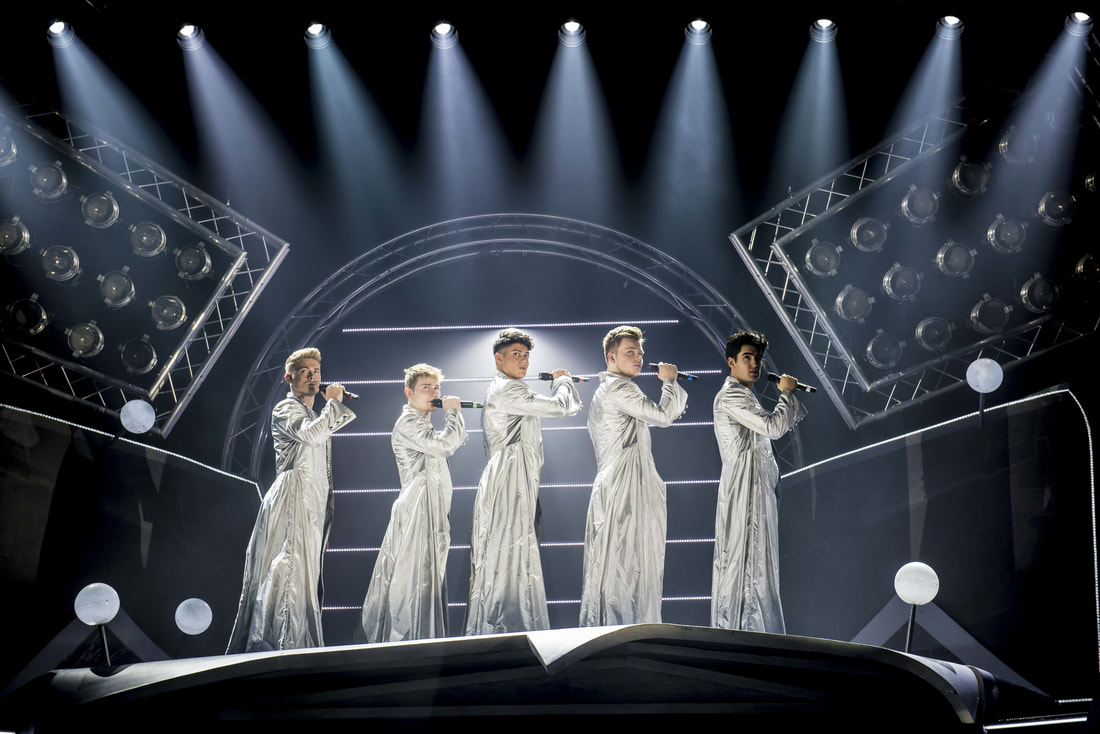
THE BAND
* * * *
May 29, 2018
Derngate, Northampton, until Saturday, June 2, 2018, then tour continues
It could hardly be more contrived: a jukebox musical containing the songs of the ultimate contrived boy band Take That; a heartwarming script about a squad of boy-band fans who drift apart before coming together again 25 years later; an on-stage boy band created specially for this show by a TV talent competition; and the rabble-rousing songs of Gary Barlow et al deliberately constructed to generate a sense of conformity and solidarity through the power of shared voices and unison fist pumps.
For all its manufactured confection, The Band has something that its real-life progenitors also have by the bucketload, and that’s an emotional heart. Say what you like about Gary, Robbie, Mark, Jason and Howard, you can’t dispute their northern charm and cheeky lovability, and it’s this winning quality that carries through into this show, earning roars of approval and waves of affection from the (mainly female, it must be said) appreciative audience.
Playwright Tim Firth – who previously teamed up with Barlow for the musical version of Calendar Girls – has woven a simple story of five teenage friends and their communal dedication to the boys. There’s not much depth to it beyond a kind of homespun Mancunian fairytale but it serves its purpose. Threaded through the narrative are the songs, sometimes performed as if in a huge arena by the five lads, sometimes with them inveigling themselves into the girls’ thoughts and lives as a sort of on-stage Greek chorus.
This occasionally means the tunes become incidental music when they should really be centre-stage, but nobody seems to mind or notice too much. They’re a great excuse for getting the boys kitted out in outfits from airline pilots to statues in a fountain, and directors Kim Gavin and Jack Ryder make the most of every opportunity.
Two things stand out. The first is a terrific set by Jon Bausor, which ingeniously creates scenes as varied as a backstreet kitchen, a Czech concert stadium and a rocky hillside. The second is the show-stealing turn by Andy Williams as almost every secondary character in the story, from world-weary roadie to officious Prague policeman. Whatever he’s playing, his comic timing and cameos are beautifully drawn.
Musically, the on-stage band are tight but far too loud – in fact, the sound balance is alarmingly poor throughout – but the vocals are stunning and Five to Five, the boy band who are/aren’t Take That, have an energy and chemistry together that is always entertaining to watch.
If you’re a Take That fan, it’s essential viewing. If you’re not, but you value great music performed with great passion, it’s still a terrific night out. All together now: “Ne-ver (clap) forget where you’ve come from…”
* * * *
May 29, 2018
Derngate, Northampton, until Saturday, June 2, 2018, then tour continues
It could hardly be more contrived: a jukebox musical containing the songs of the ultimate contrived boy band Take That; a heartwarming script about a squad of boy-band fans who drift apart before coming together again 25 years later; an on-stage boy band created specially for this show by a TV talent competition; and the rabble-rousing songs of Gary Barlow et al deliberately constructed to generate a sense of conformity and solidarity through the power of shared voices and unison fist pumps.
For all its manufactured confection, The Band has something that its real-life progenitors also have by the bucketload, and that’s an emotional heart. Say what you like about Gary, Robbie, Mark, Jason and Howard, you can’t dispute their northern charm and cheeky lovability, and it’s this winning quality that carries through into this show, earning roars of approval and waves of affection from the (mainly female, it must be said) appreciative audience.
Playwright Tim Firth – who previously teamed up with Barlow for the musical version of Calendar Girls – has woven a simple story of five teenage friends and their communal dedication to the boys. There’s not much depth to it beyond a kind of homespun Mancunian fairytale but it serves its purpose. Threaded through the narrative are the songs, sometimes performed as if in a huge arena by the five lads, sometimes with them inveigling themselves into the girls’ thoughts and lives as a sort of on-stage Greek chorus.
This occasionally means the tunes become incidental music when they should really be centre-stage, but nobody seems to mind or notice too much. They’re a great excuse for getting the boys kitted out in outfits from airline pilots to statues in a fountain, and directors Kim Gavin and Jack Ryder make the most of every opportunity.
Two things stand out. The first is a terrific set by Jon Bausor, which ingeniously creates scenes as varied as a backstreet kitchen, a Czech concert stadium and a rocky hillside. The second is the show-stealing turn by Andy Williams as almost every secondary character in the story, from world-weary roadie to officious Prague policeman. Whatever he’s playing, his comic timing and cameos are beautifully drawn.
Musically, the on-stage band are tight but far too loud – in fact, the sound balance is alarmingly poor throughout – but the vocals are stunning and Five to Five, the boy band who are/aren’t Take That, have an energy and chemistry together that is always entertaining to watch.
If you’re a Take That fan, it’s essential viewing. If you’re not, but you value great music performed with great passion, it’s still a terrific night out. All together now: “Ne-ver (clap) forget where you’ve come from…”
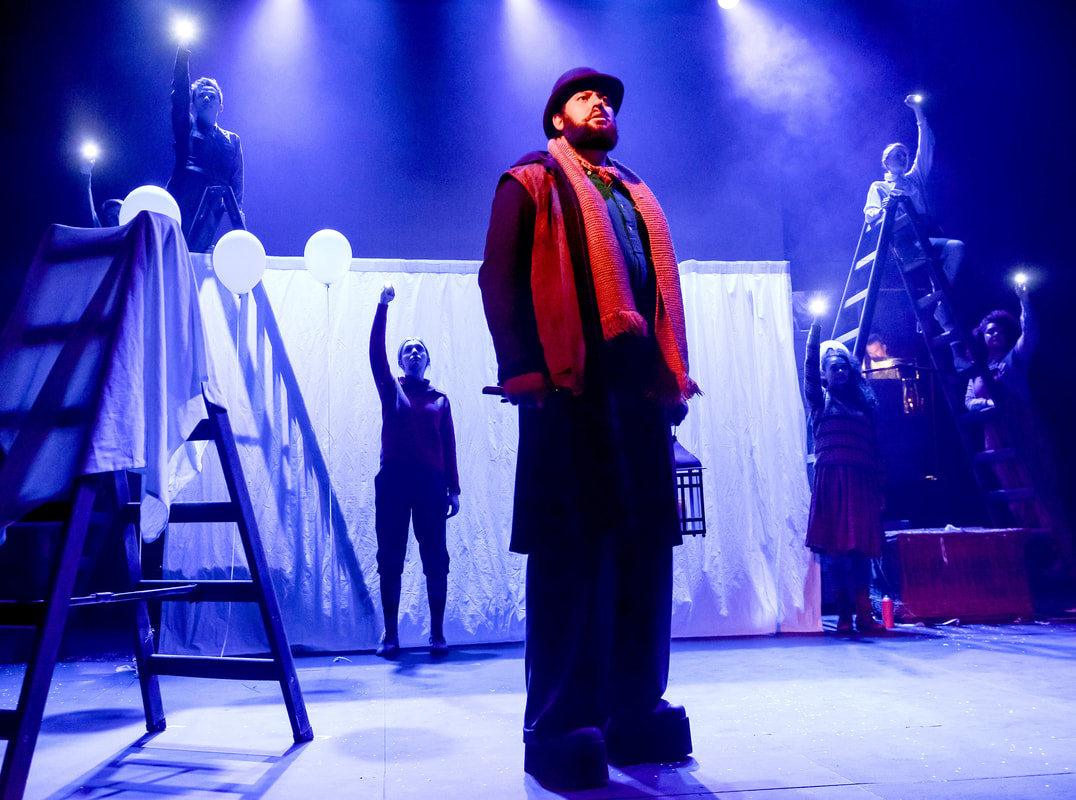 Basso profundo: Jeff Nicholson in the new musical by Guy Chambers. Picture by Robert Day.
Basso profundo: Jeff Nicholson in the new musical by Guy Chambers. Picture by Robert Day.
THE SELFISH GIANT
* * *
April 6, 2018
Royal Theatre, Northampton, until Saturday April 7, 2018, then transferring to the Vaudeville Theatre, London, until Saturday, April 14, 2018
There’s no denying the songwriting pedigree of Guy Chambers: he’s the co-writer behind such massive Robbie Williams hits as Let Me Entertain You, Angels and Millennium, as well as a raft of work with artists from Julian Lennon to Kylie Minogue.
So the prospect of a new Chambers musical, based on the Oscar Wilde children’s story The Selfish Giant and opening in Northampton ahead of a brief run in London, is certainly an intriguing one. With the billing describing it as a “folk opera”, the intrigue deepens.
In fact, what we get is 80 minutes of Chambers tunes – finely crafted and musically sound – that are firmly in the pop idiom. Arguably, the inclusion of four strings in the nine-strong band might stake a claim for some folk connection, but if you’re expecting The Hired Man or Mumford & Sons, you’re in for a rude awakening.
Chambers has clearly laboured lovingly over the music and arrangements, which are constantly interesting and lush and delivered impeccably by the on-stage band and an ensemble of eight adults-playing-children, whose harmonies and warm blends make for a truly impressive sound. Not forgetting the giant himself, performed in an unfeasibly deep basso profundo by Jeff Nicholson.
Wilde’s rather curious Christian allegory is retold with a mixture of bits that often feel rooted elsewhere. The ‘children’ occasionally feel like they’ve stepped out of Godspell in their dungarees and primary colours, the Robbie parody-style song by a personification of Hail feels a little too close to Joseph’s Pharaoh, and the whole production - really a cantata with scenery - seems almost too lightweight to sustain its one-act running time.
The cast work hard with the material and director Bill Buckhurst throws in some nice ideas, from handing out audience flashlights for a strategic starlight moment to the use of white and coloured balloons for visual effect. And in the end, it’s a pleasant enough diversion without ever blowing you away. Quite how the audiences in London will take to it is anybody’s guess.
* * *
April 6, 2018
Royal Theatre, Northampton, until Saturday April 7, 2018, then transferring to the Vaudeville Theatre, London, until Saturday, April 14, 2018
There’s no denying the songwriting pedigree of Guy Chambers: he’s the co-writer behind such massive Robbie Williams hits as Let Me Entertain You, Angels and Millennium, as well as a raft of work with artists from Julian Lennon to Kylie Minogue.
So the prospect of a new Chambers musical, based on the Oscar Wilde children’s story The Selfish Giant and opening in Northampton ahead of a brief run in London, is certainly an intriguing one. With the billing describing it as a “folk opera”, the intrigue deepens.
In fact, what we get is 80 minutes of Chambers tunes – finely crafted and musically sound – that are firmly in the pop idiom. Arguably, the inclusion of four strings in the nine-strong band might stake a claim for some folk connection, but if you’re expecting The Hired Man or Mumford & Sons, you’re in for a rude awakening.
Chambers has clearly laboured lovingly over the music and arrangements, which are constantly interesting and lush and delivered impeccably by the on-stage band and an ensemble of eight adults-playing-children, whose harmonies and warm blends make for a truly impressive sound. Not forgetting the giant himself, performed in an unfeasibly deep basso profundo by Jeff Nicholson.
Wilde’s rather curious Christian allegory is retold with a mixture of bits that often feel rooted elsewhere. The ‘children’ occasionally feel like they’ve stepped out of Godspell in their dungarees and primary colours, the Robbie parody-style song by a personification of Hail feels a little too close to Joseph’s Pharaoh, and the whole production - really a cantata with scenery - seems almost too lightweight to sustain its one-act running time.
The cast work hard with the material and director Bill Buckhurst throws in some nice ideas, from handing out audience flashlights for a strategic starlight moment to the use of white and coloured balloons for visual effect. And in the end, it’s a pleasant enough diversion without ever blowing you away. Quite how the audiences in London will take to it is anybody’s guess.
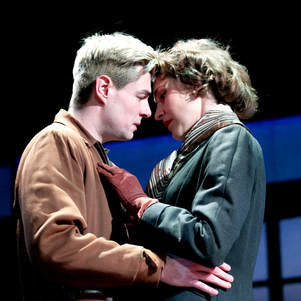 Stranger things: Sam Frenchum and Helen Bradbury in Love From a Stranger. Photo by Sheila Burnett.
Stranger things: Sam Frenchum and Helen Bradbury in Love From a Stranger. Photo by Sheila Burnett.
LOVE FROM A STRANGER
* * *
March 10, 2018
Royal Theatre, Northampton, until Saturday, March 17, 2018, then touring
Whatever preconceptions you have of an Agatha Christie story, be prepared to shed them now. If you’re expecting a murder, a detective and a country house full of suspects, you’re going to be sorely disappointed. Nor is there any sign of a high-stakes trial or duelling lawyers in this 1936 stage play by the queen of crime.
In fact, for the first two hours of this two-and-a-half-hour play, it resembles something more like Noel Coward or Terence Rattigan in its domesticity and subject matter, in which Cecily Harrington drops her dull fiancé Michael within minutes of meeting the exotic American stranger Bruce, much to the dismay of her down-to-earth flatmate and snobbish aunt.
Disappointingly, Christie’s piece – admittedly reworked by actor Frank Vosper soon after it was written to give himself a juicy leading role – has little of Coward’s sparkling wit or Rattigan’s atmospheric tension. Surprisingly for a Christie, it actually trundles along in a rather pedestrian way for most of its duration, only coming to life in the final few minutes, when the twists and turns come implausibly quickly and you’re left scratching your head about who the victim really is.
Fortunately, the production is in the hands of director Lucy Bailey and designer Mike Britton, who translate the action to 1958 and give us some beautifully realised images and moments along the way. Britton’s set in particular, with its sliding sections that open up hidden areas of the two properties involved, is ingenious and inventive, while Oliver Fenwick’s lighting makes a decent attempt to make up for the lack of drama in the action.
Helen Bradbury makes an elegant leading lady, all crisp tones and businesslike independent woman, while Sam Frenchum works well with what he’s got as the intriguing foreigner who turns her life upside down. There’s strong support, too, from Alice Haig as the mystified flatmate and especially Justin Avoth, superbly put-upon but stiff-upper-lipped as the jilted Michael.
It’s rather an odd choice of play to launch on such an extensive tour and may well bemuse audiences who are expecting something more like Bailey’s other recent Christie success, Witness for the Prosecution. But there’s much to enjoy in the performances and handsome appearance of the production, especially if you accept the programme’s assertion that it’s not so much a whodunit as a whodunwhat.
* * *
March 10, 2018
Royal Theatre, Northampton, until Saturday, March 17, 2018, then touring
Whatever preconceptions you have of an Agatha Christie story, be prepared to shed them now. If you’re expecting a murder, a detective and a country house full of suspects, you’re going to be sorely disappointed. Nor is there any sign of a high-stakes trial or duelling lawyers in this 1936 stage play by the queen of crime.
In fact, for the first two hours of this two-and-a-half-hour play, it resembles something more like Noel Coward or Terence Rattigan in its domesticity and subject matter, in which Cecily Harrington drops her dull fiancé Michael within minutes of meeting the exotic American stranger Bruce, much to the dismay of her down-to-earth flatmate and snobbish aunt.
Disappointingly, Christie’s piece – admittedly reworked by actor Frank Vosper soon after it was written to give himself a juicy leading role – has little of Coward’s sparkling wit or Rattigan’s atmospheric tension. Surprisingly for a Christie, it actually trundles along in a rather pedestrian way for most of its duration, only coming to life in the final few minutes, when the twists and turns come implausibly quickly and you’re left scratching your head about who the victim really is.
Fortunately, the production is in the hands of director Lucy Bailey and designer Mike Britton, who translate the action to 1958 and give us some beautifully realised images and moments along the way. Britton’s set in particular, with its sliding sections that open up hidden areas of the two properties involved, is ingenious and inventive, while Oliver Fenwick’s lighting makes a decent attempt to make up for the lack of drama in the action.
Helen Bradbury makes an elegant leading lady, all crisp tones and businesslike independent woman, while Sam Frenchum works well with what he’s got as the intriguing foreigner who turns her life upside down. There’s strong support, too, from Alice Haig as the mystified flatmate and especially Justin Avoth, superbly put-upon but stiff-upper-lipped as the jilted Michael.
It’s rather an odd choice of play to launch on such an extensive tour and may well bemuse audiences who are expecting something more like Bailey’s other recent Christie success, Witness for the Prosecution. But there’s much to enjoy in the performances and handsome appearance of the production, especially if you accept the programme’s assertion that it’s not so much a whodunit as a whodunwhat.
THE PLAY THAT GOES WRONG
* * * *
January 5, 2018
Derngate, Northampton, until Sunday, January 7, 2018, then tour continues
Now something of a legend, not to mention the first in an expanding brand of comic catastrophes, The Play That Goes Wrong was first seen in Northampton in the smaller, more intimate setting of the Royal auditorium. Now, with several years of touring under its belt, the show kicks off a nine-month national journey in the more commercial and much bigger house next door.
The reasons for the switch are understandable: with this solid, bankable hit of a farce, it makes sense to reach the maximum number of theatregoers possible. But something of the ramshackle nature of the supposed Cornley Polytechnic Dramatic Society’s student production of The Murder at Havisham Manor is inevitably lost when it’s performed on such a scale. The in-joke of the bad-ness of the performance is rather undermined by the professional size of the whole enterprise.
That’s not to say that The Play That Goes Wrong is any less slick, hilarious or brilliantly conceived than when it first did the rounds. Its murder mystery script is superbly accurate, its physical gags and scene-stealing sets meticulous in their timing and execution, and the show is both warm and horribly cringeworthy in roughly equal measure.
Squirm along with Jake Currran’s director character Chris as he vainly tries to hold things together in the face of one disaster after another. From collapsing scenery to cast squabbles, inadvertent injuries to full-blown assaults, the pace of the anarchy never lets up across more than two hours of chaos.
Gabriel Paul is a wonderfully indifferent stage technician, more interested in his lost Duran Duran CD than in cueing the correct sound effect. Catherine Dryden relishes her role as the assistant stage manager dragooned into playing the female lead. And Bobby Hirston makes the most of his doubling up as an upper-class twit and the all-important estate gardener, both played with delightfully inane ineptitude.
If you’ve seen it before, some of the initial sheen is a teeny bit less burnished at second viewing. If you haven’t, it’s still a tour de force and a night of relentless belly laughs. Whether they’ll all survive until the end of the tour in September remains to be seen.
* * * *
January 5, 2018
Derngate, Northampton, until Sunday, January 7, 2018, then tour continues
Now something of a legend, not to mention the first in an expanding brand of comic catastrophes, The Play That Goes Wrong was first seen in Northampton in the smaller, more intimate setting of the Royal auditorium. Now, with several years of touring under its belt, the show kicks off a nine-month national journey in the more commercial and much bigger house next door.
The reasons for the switch are understandable: with this solid, bankable hit of a farce, it makes sense to reach the maximum number of theatregoers possible. But something of the ramshackle nature of the supposed Cornley Polytechnic Dramatic Society’s student production of The Murder at Havisham Manor is inevitably lost when it’s performed on such a scale. The in-joke of the bad-ness of the performance is rather undermined by the professional size of the whole enterprise.
That’s not to say that The Play That Goes Wrong is any less slick, hilarious or brilliantly conceived than when it first did the rounds. Its murder mystery script is superbly accurate, its physical gags and scene-stealing sets meticulous in their timing and execution, and the show is both warm and horribly cringeworthy in roughly equal measure.
Squirm along with Jake Currran’s director character Chris as he vainly tries to hold things together in the face of one disaster after another. From collapsing scenery to cast squabbles, inadvertent injuries to full-blown assaults, the pace of the anarchy never lets up across more than two hours of chaos.
Gabriel Paul is a wonderfully indifferent stage technician, more interested in his lost Duran Duran CD than in cueing the correct sound effect. Catherine Dryden relishes her role as the assistant stage manager dragooned into playing the female lead. And Bobby Hirston makes the most of his doubling up as an upper-class twit and the all-important estate gardener, both played with delightfully inane ineptitude.
If you’ve seen it before, some of the initial sheen is a teeny bit less burnished at second viewing. If you haven’t, it’s still a tour de force and a night of relentless belly laughs. Whether they’ll all survive until the end of the tour in September remains to be seen.
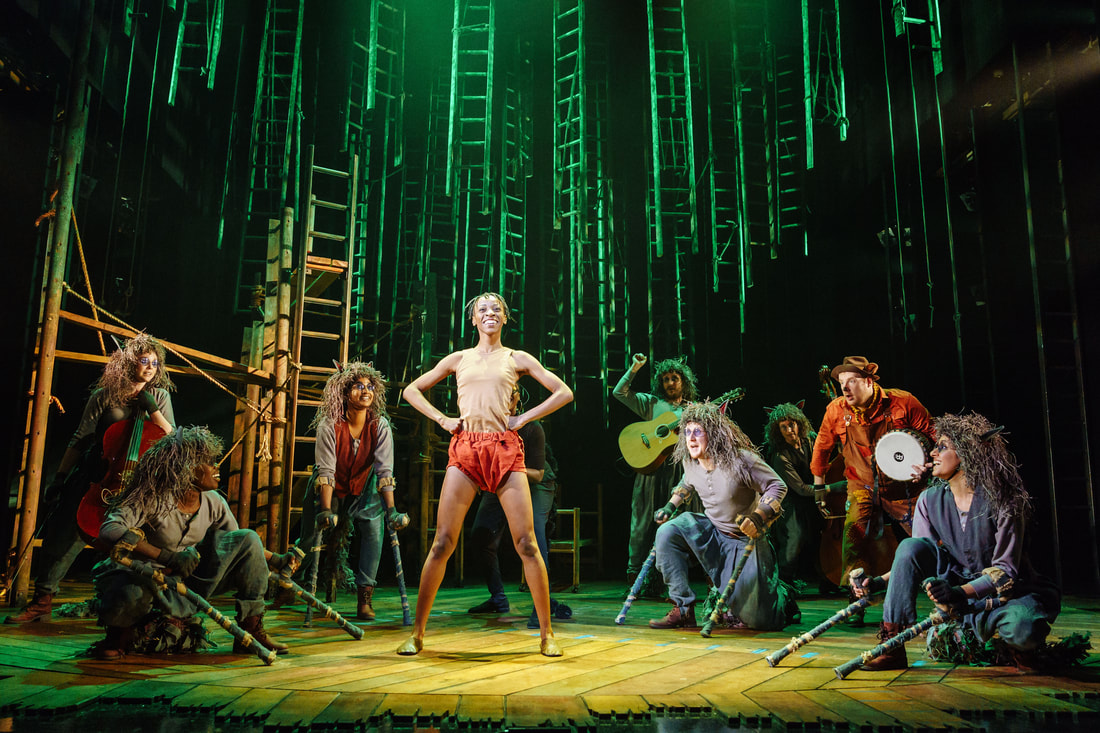 It's a jungle out there: Keziah Joseph leads the cast of The Jungle Book. Picture by Manuel Harlan.
It's a jungle out there: Keziah Joseph leads the cast of The Jungle Book. Picture by Manuel Harlan.
THE JUNGLE BOOK
* * *
December 9, 2017
Royal Theatre, Northampton, until Sunday, December 31, 2017, then touring
Rudyard Kipling’s 1894 classic The Jungle Book gets a bit of a 21st century makeover at the hands of Nell Gwynn playwright Jessica Swale and songwriter Joe Stilgoe. Working over their raw material in a bid to make it accessible to today’s younger generation, what they sacrifice in poetry and grandeur they make up for with modern relevance and a unifying message of diversity.
Playing as the Royal’s Christmas show ahead of an extensive national tour, the production looks terrific and bundles along with energy and enthusiasm courtesy of an 11-strong cast. Some double as musicians to accompany percussionist Diogo Gomes, who provides the beating musical heart of the show with his multi-tasking versatility as he brings world music flavours to Stilgoe’s simple, straightforward score.
Directed by Max Webster, this Jungle Book takes recognisable elements of Disney’s most famous version and recasts them with an affable script and a handful of easily digestible songs, never taxing the audience particularly or, for that matter, drawing on significant depths of emotion or drama.
Thus we get a pleasantly enjoyable stroll through the Kipling catalogue, complete with a jazzy Balloo (Dyfrig Morris), amiably villainous Shere Khan (Lloyd Gorman) and fish-out-of-water protagonist Mowgli (Keziah Joseph). Along the way there’s a squad of boisterous monkeys, a rather voluptuous snake and a pack of anxious wolves to add colour to the narrative, all enhanced by Peter McKintosh’s terrific set and costume designs.
Some of the updating feels rather forced and the show is a little short of festive fun, but there are some nicely poignant moments and an undeniably upbeat momentum to proceedings that carry it through and are sure to make it a popular addition to 2018’s touring circuit.
* * *
December 9, 2017
Royal Theatre, Northampton, until Sunday, December 31, 2017, then touring
Rudyard Kipling’s 1894 classic The Jungle Book gets a bit of a 21st century makeover at the hands of Nell Gwynn playwright Jessica Swale and songwriter Joe Stilgoe. Working over their raw material in a bid to make it accessible to today’s younger generation, what they sacrifice in poetry and grandeur they make up for with modern relevance and a unifying message of diversity.
Playing as the Royal’s Christmas show ahead of an extensive national tour, the production looks terrific and bundles along with energy and enthusiasm courtesy of an 11-strong cast. Some double as musicians to accompany percussionist Diogo Gomes, who provides the beating musical heart of the show with his multi-tasking versatility as he brings world music flavours to Stilgoe’s simple, straightforward score.
Directed by Max Webster, this Jungle Book takes recognisable elements of Disney’s most famous version and recasts them with an affable script and a handful of easily digestible songs, never taxing the audience particularly or, for that matter, drawing on significant depths of emotion or drama.
Thus we get a pleasantly enjoyable stroll through the Kipling catalogue, complete with a jazzy Balloo (Dyfrig Morris), amiably villainous Shere Khan (Lloyd Gorman) and fish-out-of-water protagonist Mowgli (Keziah Joseph). Along the way there’s a squad of boisterous monkeys, a rather voluptuous snake and a pack of anxious wolves to add colour to the narrative, all enhanced by Peter McKintosh’s terrific set and costume designs.
Some of the updating feels rather forced and the show is a little short of festive fun, but there are some nicely poignant moments and an undeniably upbeat momentum to proceedings that carry it through and are sure to make it a popular addition to 2018’s touring circuit.
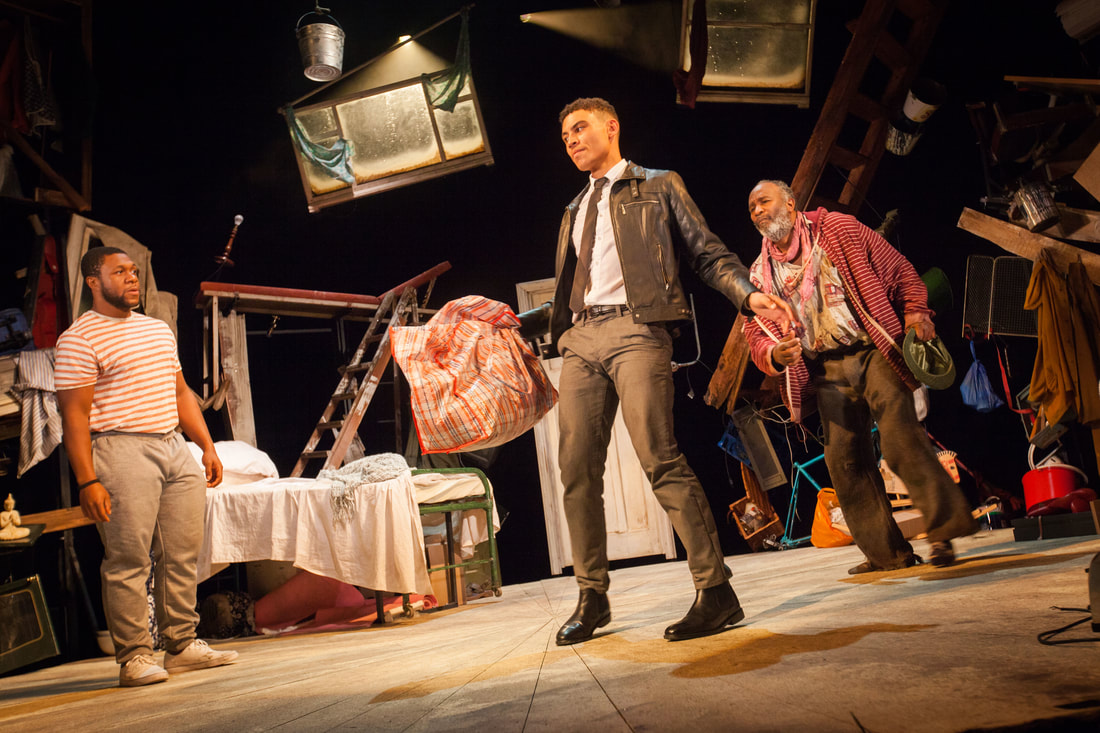 Taking care: Jonathan Livingstone, David Judge and Patrice Naiambana.
Photo by Iona Firouzabadi.
Taking care: Jonathan Livingstone, David Judge and Patrice Naiambana.
Photo by Iona Firouzabadi.
THE CARETAKER
* * * *
October 18, 2017
Royal Theatre, Northampton, until Saturday October 28, 2017
The Caretaker was the play that made Harold Pinter’s name in 1960. The very qualities described by the adjective Pinteresque can be discerned in every line and action of the play, which is as confusing, menacing and gripping as it must have seemed to the first London audiences nearly 60 years ago.
It’s full of strange pauses, random meanderings and inexplicable outbursts of fury, all held together by the thread of a narrative concerning the tramp Davies, offered shelter by the enigmatic Aston in a rundown tenement building he’s supposed to be doing up for his brother Mick. The relationship between the three characters is itself full of dark hints and unknown secrets, and Pinter deliberately makes it impossible to pin down who is on whose side, who the audience should be sympathising with, and even who’s real.
In lesser hands, this could make for a rambling, incomprehensible mess. Thanks to Pinter’s unique talent, and the wonderfully impressive cast and creative team on this new touring production, it’s a mesmerising evening of intrigue, nuance and discovery. Director Christopher Haydon, in his first gig since stepping down from the helm of London’s Gate Theatre, measures the pace beautifully, contrasting the bumbling, people-pleasing Davies with the stillness of the two brothers’ succinct delivery.
Oliver Townsend’s stunning set design creates a hive-like environment of junk and collapsing furniture that paints an impressionistic picture of dilapidation to echo the chaotic atmosphere of the action. And although Elena Pena’s constantly humming electrical underscore becomes irritating after a while, it certainly adds to the undercurrent of threat that lurks just a heartbeat away.
The decision to cast an all-black ensemble could be seen as challenging, but it pays off superbly. Patrice Naiambana gives Davies a Caribbean patois that fits Pinter’s language with surprising ease, and the uncomfortable racism of Davies’s complaints about the “black” neighbours is happily subverted by his own ethnic origins. Naiambana’s tramp is, by turns, eccentric and lovable, painful and pathetic.
Jonathan Livingstone offers an Aston who is naïve and childlike, but also vaguely disturbing in his blankness, and it’s one of the highlights of the performance when he reveals a heartbreaking moment from his past that could provide the key to what’s going on.
David Judge, meanwhile, is a revelation as the dangerous dodgy dealer Mick. Springing – both literally and metaphorically – around the set and the script, Judge is constantly watchable and breathes a terrifyingly authentic life into the mysterious man-boy with a performance that is perfectly pitched between roguishness and thuggishness.
Pinter’s piece may not be any clearer with the benefit of six decades’ hindsight, but it’s delivered powerfully and with passion in a production that serves its author well. Having played in Bristol and Southampton, there are only a few performances left in Northampton to catch this little gem.
* * * *
October 18, 2017
Royal Theatre, Northampton, until Saturday October 28, 2017
The Caretaker was the play that made Harold Pinter’s name in 1960. The very qualities described by the adjective Pinteresque can be discerned in every line and action of the play, which is as confusing, menacing and gripping as it must have seemed to the first London audiences nearly 60 years ago.
It’s full of strange pauses, random meanderings and inexplicable outbursts of fury, all held together by the thread of a narrative concerning the tramp Davies, offered shelter by the enigmatic Aston in a rundown tenement building he’s supposed to be doing up for his brother Mick. The relationship between the three characters is itself full of dark hints and unknown secrets, and Pinter deliberately makes it impossible to pin down who is on whose side, who the audience should be sympathising with, and even who’s real.
In lesser hands, this could make for a rambling, incomprehensible mess. Thanks to Pinter’s unique talent, and the wonderfully impressive cast and creative team on this new touring production, it’s a mesmerising evening of intrigue, nuance and discovery. Director Christopher Haydon, in his first gig since stepping down from the helm of London’s Gate Theatre, measures the pace beautifully, contrasting the bumbling, people-pleasing Davies with the stillness of the two brothers’ succinct delivery.
Oliver Townsend’s stunning set design creates a hive-like environment of junk and collapsing furniture that paints an impressionistic picture of dilapidation to echo the chaotic atmosphere of the action. And although Elena Pena’s constantly humming electrical underscore becomes irritating after a while, it certainly adds to the undercurrent of threat that lurks just a heartbeat away.
The decision to cast an all-black ensemble could be seen as challenging, but it pays off superbly. Patrice Naiambana gives Davies a Caribbean patois that fits Pinter’s language with surprising ease, and the uncomfortable racism of Davies’s complaints about the “black” neighbours is happily subverted by his own ethnic origins. Naiambana’s tramp is, by turns, eccentric and lovable, painful and pathetic.
Jonathan Livingstone offers an Aston who is naïve and childlike, but also vaguely disturbing in his blankness, and it’s one of the highlights of the performance when he reveals a heartbreaking moment from his past that could provide the key to what’s going on.
David Judge, meanwhile, is a revelation as the dangerous dodgy dealer Mick. Springing – both literally and metaphorically – around the set and the script, Judge is constantly watchable and breathes a terrifyingly authentic life into the mysterious man-boy with a performance that is perfectly pitched between roguishness and thuggishness.
Pinter’s piece may not be any clearer with the benefit of six decades’ hindsight, but it’s delivered powerfully and with passion in a production that serves its author well. Having played in Bristol and Southampton, there are only a few performances left in Northampton to catch this little gem.
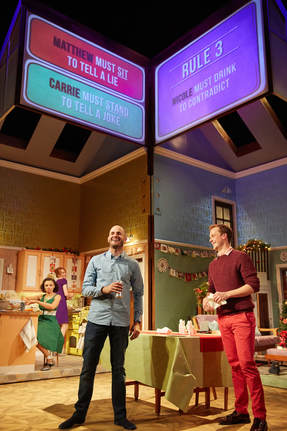 Unruly: Ed Hughes (left) and Jolyon Coy play sparring brothers in Rules for Living. Picture by Mark Douet.
Unruly: Ed Hughes (left) and Jolyon Coy play sparring brothers in Rules for Living. Picture by Mark Douet.
RULES FOR LIVING
* * *
September 15, 2017
Royal Theatre, Northampton, until Saturday September 30, 2017, then touring until Saturday, November 18, 2017
There’s a theory used in Cognitive Behavioural Therapy that we all develop psychological coping strategies to help us deal with everyday life. Consciously or otherwise, from early childhood we take on little habits or devices to trick ourselves into being able to handle the stuff we have to face. So, for instance, someone might hum to themselves in an awkward social situation, while someone else might fiddle with their wedding ring while having to make a speech.
From this fascinating starting point – and her own experience of therapy – playwright Sam Holcroft has created, naturally enough, a messy farce out of a family’s hidden undercurrents. First produced at the National Theatre in 2015, the play launches this new touring outing at Northampton’s Royal Theatre.
The piece throws together six members of the same family – father, mother, two sons and their partners, plus a brief appearance from a teenage granddaughter – for a chaotic, crisply choreographed Christmas lunch. Each of them has their own “rules” for getting through, which are flashed up onto the set at regular intervals in a series of colour-coded projections that consistently remind us who has which psychological tic.
Lily Arnold’s set design and Andrzej Gouldings projections are, in fact, among the highlights of the show, literally setting the stage for the unfolding madness as secrets are revealed, motivations challenged and the whole fabric of the family unit pushed to the edge of disintegration.
Jolyon Coy and Ed Hughes play the sparking brothers with easily recognisable sibling japery, while Jane Booker’s mother character hovers vertiginously on the edge of civility as she downs medicinal aids to deal with the day. Simon Godwin’s direction borders on the frenetic at times as the action descends into less-than-credible anarchy and the characters’ rules start to clash with the conventions of farce, but it’s all delivered in an efficiently drilled ballet that leads implacably to its riotous conclusion.
* * *
September 15, 2017
Royal Theatre, Northampton, until Saturday September 30, 2017, then touring until Saturday, November 18, 2017
There’s a theory used in Cognitive Behavioural Therapy that we all develop psychological coping strategies to help us deal with everyday life. Consciously or otherwise, from early childhood we take on little habits or devices to trick ourselves into being able to handle the stuff we have to face. So, for instance, someone might hum to themselves in an awkward social situation, while someone else might fiddle with their wedding ring while having to make a speech.
From this fascinating starting point – and her own experience of therapy – playwright Sam Holcroft has created, naturally enough, a messy farce out of a family’s hidden undercurrents. First produced at the National Theatre in 2015, the play launches this new touring outing at Northampton’s Royal Theatre.
The piece throws together six members of the same family – father, mother, two sons and their partners, plus a brief appearance from a teenage granddaughter – for a chaotic, crisply choreographed Christmas lunch. Each of them has their own “rules” for getting through, which are flashed up onto the set at regular intervals in a series of colour-coded projections that consistently remind us who has which psychological tic.
Lily Arnold’s set design and Andrzej Gouldings projections are, in fact, among the highlights of the show, literally setting the stage for the unfolding madness as secrets are revealed, motivations challenged and the whole fabric of the family unit pushed to the edge of disintegration.
Jolyon Coy and Ed Hughes play the sparking brothers with easily recognisable sibling japery, while Jane Booker’s mother character hovers vertiginously on the edge of civility as she downs medicinal aids to deal with the day. Simon Godwin’s direction borders on the frenetic at times as the action descends into less-than-credible anarchy and the characters’ rules start to clash with the conventions of farce, but it’s all delivered in an efficiently drilled ballet that leads implacably to its riotous conclusion.
THE GRAPES OF WRATH
* *
May 10, 2017
Royal Theatre, Northampton, until Saturday, May 20, 2017, then tour continues
Heavy-handed, rather dull minimalistic interpretation of the John Steinbeck American classic.
For Michael Davies’s full review, visit www.whatsonstage.com
* *
May 10, 2017
Royal Theatre, Northampton, until Saturday, May 20, 2017, then tour continues
Heavy-handed, rather dull minimalistic interpretation of the John Steinbeck American classic.
For Michael Davies’s full review, visit www.whatsonstage.com
THE ADDAMS FAMILY
* * * *
May 9, 2017
Derngate, Northampton, until Saturday, May 13, 2017, then tour continues
It has a paper-thin plot that would barely fill a sitcom half-hour, a cast of one-dimensional characterisations with as much depth as their cartoon counterparts, and an ensemble of energetic but utterly superfluous dead ancestors who do nothing but make up the numbers on stage. I predict The Addams Family is going to be a big hit.
Watching this show is a bizarre and weird experience, and not just in the spooky/ooky/kooky way you’d expect. Everything about it screams that it’s a terrible idea to transform a hoary old black-and-white US sitcom into a song-and-dance spectacular. While Morticia, Gomez, Fester and the rest might make for an amusing diversion on a wet school holiday afternoon in the 1960s, how could they possibly sustain an entire evening’s entertainment in the Broadway mould?
The answer is, of course, that they can’t. That wafer of a plot (Wednesday falls in love with a ‘normal’ boy, much to the family’s horror) is stretched almost to breaking point as each family member formulaically gets their moment in the spotlight. Structurally, the scenes roll episodically from one to another, a few lines of amusing dialogue serving merely as an excuse to lead into another of Andrew Lippa’s pastiche songs.
It should be a train wreck. And yet…
And yet there’s a warmth at the core of the show that rescues it from disaster, a sense of heart and genuine affection for its source material that lifts it from potentially excruciating to a really rather enjoyable night out.
Diego Pitarch’s faithful, epic set creates the tone. Some stunning orchestrations and a tight pit band under Andrew Hilton drive the emotional content, even if the sound mix renders many of the witty lyrics indecipherable. And a bunch of lively, giving-it-their-all performances breathes refreshing life into a would-be corpse, rather as Gomez revives his ancestors to play the chorus.
Carrie Hope Fletcher, with her extensive CV and massive Youtube following, pleasingly brings new audiences into the theatre, and with good reason. As Wednesday, she’s a stunning singer, fine actress and an infectious presence. Opposite her as the love interest, Oliver Ormson holds his own terrifically.
Les Dennis makes a cheeky, poignant Uncle Fester, Grant McIntyre gives a quite extraordinary performance as younger brother Pugsley and Samantha Womack’s Morticia is every bit as languid and lugubrious as you could hope for. Dickon Gough, meanwhile, is wonderful as Lurch, virtually unnoticed until very late in proceedings, when he almost steals the entire show. That honour actually goes to Cameron Blakely, whose Gomez is so deliciously black and over-the-top that it’s hard to take your eyes off him when he’s on stage.
The Addams Family is never going to be held up as anyone’s example of the perfectly-crafted musical. As it stands, though, the production values and performances carry the night, and there’s enough nostalgic enjoyment to satisfy the loyal crowd.
* * * *
May 9, 2017
Derngate, Northampton, until Saturday, May 13, 2017, then tour continues
It has a paper-thin plot that would barely fill a sitcom half-hour, a cast of one-dimensional characterisations with as much depth as their cartoon counterparts, and an ensemble of energetic but utterly superfluous dead ancestors who do nothing but make up the numbers on stage. I predict The Addams Family is going to be a big hit.
Watching this show is a bizarre and weird experience, and not just in the spooky/ooky/kooky way you’d expect. Everything about it screams that it’s a terrible idea to transform a hoary old black-and-white US sitcom into a song-and-dance spectacular. While Morticia, Gomez, Fester and the rest might make for an amusing diversion on a wet school holiday afternoon in the 1960s, how could they possibly sustain an entire evening’s entertainment in the Broadway mould?
The answer is, of course, that they can’t. That wafer of a plot (Wednesday falls in love with a ‘normal’ boy, much to the family’s horror) is stretched almost to breaking point as each family member formulaically gets their moment in the spotlight. Structurally, the scenes roll episodically from one to another, a few lines of amusing dialogue serving merely as an excuse to lead into another of Andrew Lippa’s pastiche songs.
It should be a train wreck. And yet…
And yet there’s a warmth at the core of the show that rescues it from disaster, a sense of heart and genuine affection for its source material that lifts it from potentially excruciating to a really rather enjoyable night out.
Diego Pitarch’s faithful, epic set creates the tone. Some stunning orchestrations and a tight pit band under Andrew Hilton drive the emotional content, even if the sound mix renders many of the witty lyrics indecipherable. And a bunch of lively, giving-it-their-all performances breathes refreshing life into a would-be corpse, rather as Gomez revives his ancestors to play the chorus.
Carrie Hope Fletcher, with her extensive CV and massive Youtube following, pleasingly brings new audiences into the theatre, and with good reason. As Wednesday, she’s a stunning singer, fine actress and an infectious presence. Opposite her as the love interest, Oliver Ormson holds his own terrifically.
Les Dennis makes a cheeky, poignant Uncle Fester, Grant McIntyre gives a quite extraordinary performance as younger brother Pugsley and Samantha Womack’s Morticia is every bit as languid and lugubrious as you could hope for. Dickon Gough, meanwhile, is wonderful as Lurch, virtually unnoticed until very late in proceedings, when he almost steals the entire show. That honour actually goes to Cameron Blakely, whose Gomez is so deliciously black and over-the-top that it’s hard to take your eyes off him when he’s on stage.
The Addams Family is never going to be held up as anyone’s example of the perfectly-crafted musical. As it stands, though, the production values and performances carry the night, and there’s enough nostalgic enjoyment to satisfy the loyal crowd.
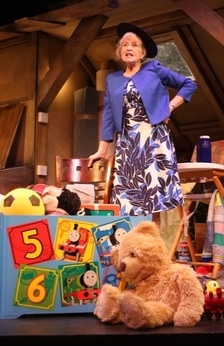 Lofty role: Liza Goddard as Betty in A Passionate Woman. Picture by Antony Thompson/Thousand Word Media.
Lofty role: Liza Goddard as Betty in A Passionate Woman. Picture by Antony Thompson/Thousand Word Media.
A PASSIONATE WOMAN
* * * *
March 7, 2017
Royal Theatre, Northampton, until Saturday March 11, 2017, then touring until Saturday, April 8, 2017
Kay Mellor is one of television’s most prodigious writers, having created series from Band of Gold to Fat Friends. But she’s not averse to turning her hand to the stage too, where she first learned her craft, and this crisp, playful piece from 1992 is typical of the Mellor mix of warm humour and painful poignancy.
On the morning of her son’s wedding, Betty finds herself in the attic reminiscing over a secret past that she’s never revealed to anyone. As the lad, Mark, her husband Donald and a ghost from her younger days variously try to encourage, cajole and entice her, Betty comes to realise the importance of seizing the day and living life to the full.
If that all sounds a bit well-worn, then maybe it is. But the panache and style with which Mellor weaves the unfolding story - based originally on her own mother - transforms the potentially formulaic into something whimsical and touching.
Paul Milton’s production, which began life at Cheltenham’s Everyman Theatre, has the added advantages of a stunning set by Michael Holt, which incorporates both the inside and the outside of Betty’s roof space, and some beautifully judged performances. Liza Goddard finds just the right balance of pathos and punchiness as the self-centred matriarch with hidden depths, although in truth she’s far too glamorous for the role.
Russell Dixon and Antony Eden are perfectly matched as father and son struggling to come to terms with Betty’s increasing waywardness, and their physicality as the near-farce plays out on the roof is brilliantly timed and hugely effective. Hasan Dixon handles the tricky role of the ghost deftly, so that it’s never completely clear if he’s really there or just a figment of Betty’s imagination, and the whole show rattles by in a brisk, efficient 95 minutes – including an interval.
With such astute casting and Milton’s light-touch direction, it’s an affecting, enjoyable evening that nudges a range of emotional targets as it heads towards its literally uplifting denouement.
* * * *
March 7, 2017
Royal Theatre, Northampton, until Saturday March 11, 2017, then touring until Saturday, April 8, 2017
Kay Mellor is one of television’s most prodigious writers, having created series from Band of Gold to Fat Friends. But she’s not averse to turning her hand to the stage too, where she first learned her craft, and this crisp, playful piece from 1992 is typical of the Mellor mix of warm humour and painful poignancy.
On the morning of her son’s wedding, Betty finds herself in the attic reminiscing over a secret past that she’s never revealed to anyone. As the lad, Mark, her husband Donald and a ghost from her younger days variously try to encourage, cajole and entice her, Betty comes to realise the importance of seizing the day and living life to the full.
If that all sounds a bit well-worn, then maybe it is. But the panache and style with which Mellor weaves the unfolding story - based originally on her own mother - transforms the potentially formulaic into something whimsical and touching.
Paul Milton’s production, which began life at Cheltenham’s Everyman Theatre, has the added advantages of a stunning set by Michael Holt, which incorporates both the inside and the outside of Betty’s roof space, and some beautifully judged performances. Liza Goddard finds just the right balance of pathos and punchiness as the self-centred matriarch with hidden depths, although in truth she’s far too glamorous for the role.
Russell Dixon and Antony Eden are perfectly matched as father and son struggling to come to terms with Betty’s increasing waywardness, and their physicality as the near-farce plays out on the roof is brilliantly timed and hugely effective. Hasan Dixon handles the tricky role of the ghost deftly, so that it’s never completely clear if he’s really there or just a figment of Betty’s imagination, and the whole show rattles by in a brisk, efficient 95 minutes – including an interval.
With such astute casting and Milton’s light-touch direction, it’s an affecting, enjoyable evening that nudges a range of emotional targets as it heads towards its literally uplifting denouement.
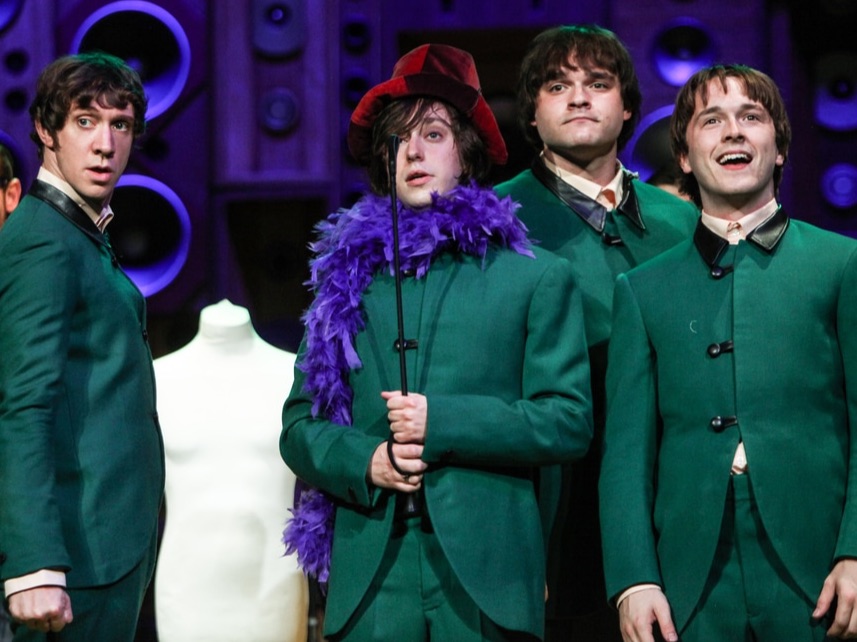 Something Kinky: From left, Ryan O'Donnell, Mark Newnham, Andrew Gallo and Garmon Rhys.
Something Kinky: From left, Ryan O'Donnell, Mark Newnham, Andrew Gallo and Garmon Rhys.
SUNNY AFTERNOON
* * * *
January 10, 2017
Derngate, Northampton, until January 14, 2017, then tour continues
It was only a matter of time before The Kinks became the subject of a stage musical, and this one is currently touring the UK after a highly successful run in the West End. Built around Ray Davies’s quirky, groundbreaking songs, it tells the story of the band’s formation, its travails at the hands of various managers and Ray’s personal battle with relationships and childhood trauma.
Joe Penhall’s script from Davies’s original story feels at times rather pedestrian and obvious but it hits all the required story beats – Ray’s depression, his younger brother Dave’s wayward lifestyle, the disastrous American tour – to recount the major incidents of the band’s glory days.
Where this production really triumphs is in its high-quality musicianship, which it wears lightly but which underscores the show and gives it its energy and relentless infectiousness. Under the on-stage command of musical director Barney Ashworth, the large ensemble all perform their own music, supplemented by some stunning guitar work from Ashley Williams.
While I have my too-frequent quibbles about the sound balance – which leaves the vocalists struggling to be heard in a dense mix – there’s no arguing with the the talent. Andrew Gallo as drummer Mick Avory is a standout performer, but all the leads pull their weight and the singing is particularly strong.
Penhall occasionally crowbars elements of the Kinks back catalogue into the action in a bid to further the narrative – such as the gorgeous a cappella version of Days – but in general the songs work best when they’re delivered straight out front, with the band playing direct to the audience. These are the moments when Ryan O’Donnell’s troubled Ray and Mark Newnham’s cheeky Dave shine brightest and the room lights up.
And if you’re a Kinks fan, there’s no shortage of great tunes to keep you entertained. Everything from Lola to Waterloo Sunset is there and by the end the crowd are on their feet in an atmosphere that’s more gig than musical and makes a fitting tribute to an English institution.
* * * *
January 10, 2017
Derngate, Northampton, until January 14, 2017, then tour continues
It was only a matter of time before The Kinks became the subject of a stage musical, and this one is currently touring the UK after a highly successful run in the West End. Built around Ray Davies’s quirky, groundbreaking songs, it tells the story of the band’s formation, its travails at the hands of various managers and Ray’s personal battle with relationships and childhood trauma.
Joe Penhall’s script from Davies’s original story feels at times rather pedestrian and obvious but it hits all the required story beats – Ray’s depression, his younger brother Dave’s wayward lifestyle, the disastrous American tour – to recount the major incidents of the band’s glory days.
Where this production really triumphs is in its high-quality musicianship, which it wears lightly but which underscores the show and gives it its energy and relentless infectiousness. Under the on-stage command of musical director Barney Ashworth, the large ensemble all perform their own music, supplemented by some stunning guitar work from Ashley Williams.
While I have my too-frequent quibbles about the sound balance – which leaves the vocalists struggling to be heard in a dense mix – there’s no arguing with the the talent. Andrew Gallo as drummer Mick Avory is a standout performer, but all the leads pull their weight and the singing is particularly strong.
Penhall occasionally crowbars elements of the Kinks back catalogue into the action in a bid to further the narrative – such as the gorgeous a cappella version of Days – but in general the songs work best when they’re delivered straight out front, with the band playing direct to the audience. These are the moments when Ryan O’Donnell’s troubled Ray and Mark Newnham’s cheeky Dave shine brightest and the room lights up.
And if you’re a Kinks fan, there’s no shortage of great tunes to keep you entertained. Everything from Lola to Waterloo Sunset is there and by the end the crowd are on their feet in an atmosphere that’s more gig than musical and makes a fitting tribute to an English institution.
PETER AND THE STARCATCHER
* * * *
December 2, 2016
Royal Theatre, Northampton, until Saturday, December 31, 2016
The European premiere of this adaptation of the Peter Pan prequel story has lots of noise, plenty of adventure and leaves you utterly exhausted.
For Michael Davies’s full review, visit whatsonstage.com
* * * *
December 2, 2016
Royal Theatre, Northampton, until Saturday, December 31, 2016
The European premiere of this adaptation of the Peter Pan prequel story has lots of noise, plenty of adventure and leaves you utterly exhausted.
For Michael Davies’s full review, visit whatsonstage.com
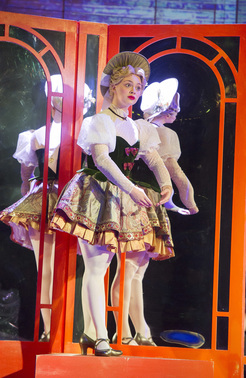 Carrie Hope Fletcher as Truly Scrumptious.
Carrie Hope Fletcher as Truly Scrumptious.
CHITTY CHITTY BANG BANG
* * *
September 23, 2016
Derngate, Northampton, until October 2, 2016, then tour continues
Depending on where you catch this lavishly-mounted tour, you’ll get a varied selection of well-known faces in the leading roles. In Northampton, that means stand-up comics Jason Manford and Phill Jupitus, with Youtube sensation Carrie Hope Fletcher and onetime Brookside star Claire Sweeney. Elsewhere, you might see Lee Mead, Charlotte Wakefield and Michelle Collins.
In the end, it doesn’t really matter, because the car that flies is the ultimate star of this show – and it really does fly, prompting wide-eyed delight from many of the younger audience members.
Except that it does matter a bit, since the cartoonish, sentimental story, originally written by Ian Fleming and filmed in 1968 with songs by Disney stalwarts Richard and Robert Sherman, relies quite heavily on pulling emotional heartstrings. And this, sadly, is where director James Brining’s decision to focus on the technical wizardry comes unstuck.
Of the current cast, Fletcher and Sweeney emerge best. Fletcher has a genuinely pleasing voice and stage persona, and her Truly Scrumptious is… well, let’s say she’s aptly named. Sweeney gets to cavort wildly as the wacky Baroness Bomburst and evidently enjoys every last moment of it. Manford and Jupitus, meanwhile, fare rather less well, with their lack of acting training and musical theatre skills unfortunately exposed.
Simon Higlett’s design doesn’t help. Because of the machinery required for the special effects, the whole performing area is forced into a shallow space at the front of the stage, rendering even the big production numbers somehow flat and two-dimensional.
On the plus side, there’s a score of straightforward, hummable tunes delivered superbly by a stunning 12-piece band under the direction of Andrew Hilton, and some entertaining cameos from Andy Hockley as the lovable grandpa and Sam Harrison and Scott Paige as a pair of blundering spies. In the end, there’s no denying the uproarious reception the show receives from its enthusiastic audience.
* * *
September 23, 2016
Derngate, Northampton, until October 2, 2016, then tour continues
Depending on where you catch this lavishly-mounted tour, you’ll get a varied selection of well-known faces in the leading roles. In Northampton, that means stand-up comics Jason Manford and Phill Jupitus, with Youtube sensation Carrie Hope Fletcher and onetime Brookside star Claire Sweeney. Elsewhere, you might see Lee Mead, Charlotte Wakefield and Michelle Collins.
In the end, it doesn’t really matter, because the car that flies is the ultimate star of this show – and it really does fly, prompting wide-eyed delight from many of the younger audience members.
Except that it does matter a bit, since the cartoonish, sentimental story, originally written by Ian Fleming and filmed in 1968 with songs by Disney stalwarts Richard and Robert Sherman, relies quite heavily on pulling emotional heartstrings. And this, sadly, is where director James Brining’s decision to focus on the technical wizardry comes unstuck.
Of the current cast, Fletcher and Sweeney emerge best. Fletcher has a genuinely pleasing voice and stage persona, and her Truly Scrumptious is… well, let’s say she’s aptly named. Sweeney gets to cavort wildly as the wacky Baroness Bomburst and evidently enjoys every last moment of it. Manford and Jupitus, meanwhile, fare rather less well, with their lack of acting training and musical theatre skills unfortunately exposed.
Simon Higlett’s design doesn’t help. Because of the machinery required for the special effects, the whole performing area is forced into a shallow space at the front of the stage, rendering even the big production numbers somehow flat and two-dimensional.
On the plus side, there’s a score of straightforward, hummable tunes delivered superbly by a stunning 12-piece band under the direction of Andrew Hilton, and some entertaining cameos from Andy Hockley as the lovable grandpa and Sam Harrison and Scott Paige as a pair of blundering spies. In the end, there’s no denying the uproarious reception the show receives from its enthusiastic audience.
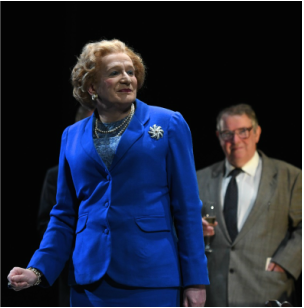 Steve Nallon and Paul Bradley in Dead Sheep.
Steve Nallon and Paul Bradley in Dead Sheep.
DEAD SHEEP
* * *
September 19, 2016
Royal Theatre, Northampton, until September 24, 2016, then touring
It was Labour’s Denis Healey who famously said that debating with Geoffrey Howe was “like being savaged by a dead sheep”. From this resonant political quote, former BBC reporter Jonathan Maitland has constructed a play of political machination, exploring the build-up to, and the reasons behind, Howe’s devastating resignation speech in 1990 which led directly to the downfall of one Margaret Hilda Thatcher.
Howe’s reputation as a bit of a bumbler is defiantly skewered. In Maitland’s version of history – and his research included conversations with Howe himself before his death – the man who will inevitably be remembered as Thatcher’s assassin is portrayed as an astute, loyal politician of considerable stature, whose only fault was to be caught between two powerful women: his leader and his wife.
The fact that his wife Elspeth ultimately won out in that conflict should come as no surprise. Howe appears to have been a warm, devoted man, given to bouts of emotion that would seem to render him entirely unfitted for his position in two of the greatest roles of state, Chancellor and Foreign Secretary.
But it was clearly far more than spite at being sacked that prompted his final, devastating speech, and it’s this territory that Maitland seeks to examine. The result is a sometimes amusing, sometimes rather clunky play that needs a first half of heavy exposition to set up its second half of interpersonal exploration and psychological motivation.
The production is played fast and furious under the directorial hand of Ian Talbot, and the six-strong cast are on the ball from first to last. Steve Nallon has made a career out of playing Mrs Thatcher, and he’s got her intonation in particular down to perfection. But he’s a better actor than this one impersonation gives him credit for, and he finds subtlety and nuance behind the battleaxe façade.
Paul Bradley offers a touching Howe, ranging from the avuncular shambler of popular perception to an intimate, poignant lieutenant forced by his principles to destroy his much-loved leader. Carol Royle completes the triangle of loyalty as Elspeth, equally torn between standing by her man and wanting to see him be the best he can be.
Graham Seed, Christopher Villiers and John Wark fill in the gaps efficiently in a host of supporting roles, from press secretary Bernard Ingham to TV journalist Brian Walden, and mine much comedy in the process, while Morgan Large’s effective set is dominated throughout by a vast photograph of Thatcher and her 1990 cabinet – significantly, entirely made up of men in dark grey suits.
The show tours the country through the autumn and will, no doubt, do good business. There’s something about Thatcher – love her or hate her – that still holds us in a grip of fascination, and Dead Sheep provides an entertaining spotlight on one corner of that story.
* * *
September 19, 2016
Royal Theatre, Northampton, until September 24, 2016, then touring
It was Labour’s Denis Healey who famously said that debating with Geoffrey Howe was “like being savaged by a dead sheep”. From this resonant political quote, former BBC reporter Jonathan Maitland has constructed a play of political machination, exploring the build-up to, and the reasons behind, Howe’s devastating resignation speech in 1990 which led directly to the downfall of one Margaret Hilda Thatcher.
Howe’s reputation as a bit of a bumbler is defiantly skewered. In Maitland’s version of history – and his research included conversations with Howe himself before his death – the man who will inevitably be remembered as Thatcher’s assassin is portrayed as an astute, loyal politician of considerable stature, whose only fault was to be caught between two powerful women: his leader and his wife.
The fact that his wife Elspeth ultimately won out in that conflict should come as no surprise. Howe appears to have been a warm, devoted man, given to bouts of emotion that would seem to render him entirely unfitted for his position in two of the greatest roles of state, Chancellor and Foreign Secretary.
But it was clearly far more than spite at being sacked that prompted his final, devastating speech, and it’s this territory that Maitland seeks to examine. The result is a sometimes amusing, sometimes rather clunky play that needs a first half of heavy exposition to set up its second half of interpersonal exploration and psychological motivation.
The production is played fast and furious under the directorial hand of Ian Talbot, and the six-strong cast are on the ball from first to last. Steve Nallon has made a career out of playing Mrs Thatcher, and he’s got her intonation in particular down to perfection. But he’s a better actor than this one impersonation gives him credit for, and he finds subtlety and nuance behind the battleaxe façade.
Paul Bradley offers a touching Howe, ranging from the avuncular shambler of popular perception to an intimate, poignant lieutenant forced by his principles to destroy his much-loved leader. Carol Royle completes the triangle of loyalty as Elspeth, equally torn between standing by her man and wanting to see him be the best he can be.
Graham Seed, Christopher Villiers and John Wark fill in the gaps efficiently in a host of supporting roles, from press secretary Bernard Ingham to TV journalist Brian Walden, and mine much comedy in the process, while Morgan Large’s effective set is dominated throughout by a vast photograph of Thatcher and her 1990 cabinet – significantly, entirely made up of men in dark grey suits.
The show tours the country through the autumn and will, no doubt, do good business. There’s something about Thatcher – love her or hate her – that still holds us in a grip of fascination, and Dead Sheep provides an entertaining spotlight on one corner of that story.
A TALE OF TWO CITIES
* * * * *
September 14, 2016
Royal Theatre, Northampton, until Saturday, September 17, 2016, then touring
A MASTERFUL revival of James Dacre’s sumptuous 2014 production brings Dickens thrillingly to life in Mike Poulton’s neat adaptation, heading out on a well-deserved tour of the UK.
For the full review visit whatsonstage.com
* * * * *
September 14, 2016
Royal Theatre, Northampton, until Saturday, September 17, 2016, then touring
A MASTERFUL revival of James Dacre’s sumptuous 2014 production brings Dickens thrillingly to life in Mike Poulton’s neat adaptation, heading out on a well-deserved tour of the UK.
For the full review visit whatsonstage.com
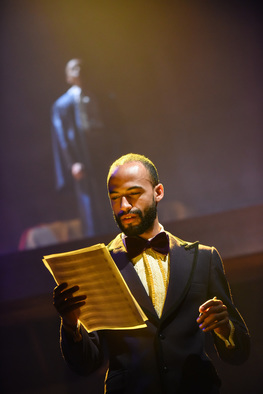 What's Going On: Nathan Ives-Moiba as Marvin Gaye in Soul. Photo by Robert Day.
What's Going On: Nathan Ives-Moiba as Marvin Gaye in Soul. Photo by Robert Day.
SOUL
* * *
May 27, 2016
Royal Theatre, Northampton, until Saturday, June 11, 2016, then transferring to Hackney Empire
THE extraordinary death of Marvin Gaye, shot by his church minister father on the eve of the singer’s 45th birthday, seemed utterly bizarre to the outside world when it was first announced back in 1984.
Now, 32 years on, eminent playwright Roy Williams enlists the first-hand stories of two of Marvin’s sisters in a bid to weave some kind of explanation, in dramatic form, from the mystifying events of that tragic day.
The co-production between Royal & Derngate and Hackney Empire has much going for it, not least some impressive performances and the intrigue of the insider access. But there’s one compelling absentee that fundamentally flaws this would-be revelatory biography: Marvin Gaye’s songs.
Stymied by the inaccessibility of the rights to use those iconic tracks – Let’s Get It On, What’s Going On, Sexual Healing et al – the show constantly feels like it’s trying to make up for what it can’t supply. Former Gaye collaborator Gordon Banks’s underscore is atmospheric without ever reaching Gaye’s heights. Jon Bausor’s intricate set pairs a shiny aluminium frame with overcrowded 70s kitsch that puts realism ahead of practicality. And Williams’s script searches desperately for some kind of meaning or logic to the murder without ever coming close to any answers.
Adjoa Andoh plays Marvin’s much-loved mother with a penetrating contradiction. Adoring her son, she sacrifices herself – and ultimately him – to her maddeningly self-obsessed husband, Marvin Senior (a gawky, tentative performance from Leo Wringer). Andoh, like her character, is at the heart of the story and director James Dacre wisely puts her centre-stage for much of the action, resisting the temptation to make it all about the father-and-son conflict.
Williams uses the two sisters as a sort of Greek chorus narrative device to frame the tale, and while Petra Letang and Mimi Ndiweni are both striking in their roles, the structure never quite hangs together satisfactorily, and the dramatic potential is never completely fulfilled.
It’s a fascinating and eye-opening story for anyone with a passing interest in the flaws of our cultural icons, and Keenan Munn-Francis and Nathan Ives-Moiba have clearly done their research as the respectively younger and older incarnations of Marvin.
But without the songs and with only the wildest surmise at any kind of genuine motivation, Soul is exactly what this play can’t quite pin down.
* * *
May 27, 2016
Royal Theatre, Northampton, until Saturday, June 11, 2016, then transferring to Hackney Empire
THE extraordinary death of Marvin Gaye, shot by his church minister father on the eve of the singer’s 45th birthday, seemed utterly bizarre to the outside world when it was first announced back in 1984.
Now, 32 years on, eminent playwright Roy Williams enlists the first-hand stories of two of Marvin’s sisters in a bid to weave some kind of explanation, in dramatic form, from the mystifying events of that tragic day.
The co-production between Royal & Derngate and Hackney Empire has much going for it, not least some impressive performances and the intrigue of the insider access. But there’s one compelling absentee that fundamentally flaws this would-be revelatory biography: Marvin Gaye’s songs.
Stymied by the inaccessibility of the rights to use those iconic tracks – Let’s Get It On, What’s Going On, Sexual Healing et al – the show constantly feels like it’s trying to make up for what it can’t supply. Former Gaye collaborator Gordon Banks’s underscore is atmospheric without ever reaching Gaye’s heights. Jon Bausor’s intricate set pairs a shiny aluminium frame with overcrowded 70s kitsch that puts realism ahead of practicality. And Williams’s script searches desperately for some kind of meaning or logic to the murder without ever coming close to any answers.
Adjoa Andoh plays Marvin’s much-loved mother with a penetrating contradiction. Adoring her son, she sacrifices herself – and ultimately him – to her maddeningly self-obsessed husband, Marvin Senior (a gawky, tentative performance from Leo Wringer). Andoh, like her character, is at the heart of the story and director James Dacre wisely puts her centre-stage for much of the action, resisting the temptation to make it all about the father-and-son conflict.
Williams uses the two sisters as a sort of Greek chorus narrative device to frame the tale, and while Petra Letang and Mimi Ndiweni are both striking in their roles, the structure never quite hangs together satisfactorily, and the dramatic potential is never completely fulfilled.
It’s a fascinating and eye-opening story for anyone with a passing interest in the flaws of our cultural icons, and Keenan Munn-Francis and Nathan Ives-Moiba have clearly done their research as the respectively younger and older incarnations of Marvin.
But without the songs and with only the wildest surmise at any kind of genuine motivation, Soul is exactly what this play can’t quite pin down.
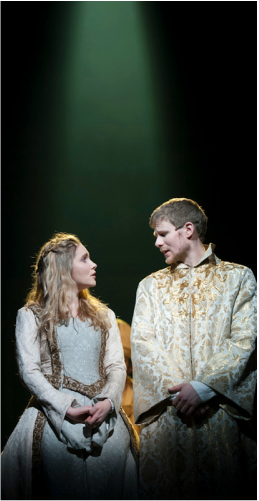 Epic: Steven Miller and Rosemary Boyle in the first of The James Plays.
Epic: Steven Miller and Rosemary Boyle in the first of The James Plays.
THE JAMES PLAYS
* * * * *
April 16, 2016
Derngate, Northampton, until Sunday, April 17, 2016, then tour continues
EVERYTHING about this cycle of Scottish history plays shouts epic. One daft reviewer even argued it was some kind of Caledonian equivalent to Game of Thrones. But that’s just not fair to playwright Rona Munro and the team that has created something rather special.
From an unlikely – and largely forgotten – corner of Scottish history, somewhere between Robert the Bruce and Mary Queen of Scots, Munro has carved out a dynastic trilogy which, at turns, haunts, thrills and traumatises. It’s a dark, medieval world of tribal brutalism, empire-building warlords and familial conspiracies, with raw emotion never far from the surface. OK, so maybe the Game of Thrones comparison isn’t quite so daft after all.
But in the hands of this master craftsman, the plays are never less than illuminating and instructive, not just for their educational content about three generations of little-known monarchs, but also for the light they cast on modern political machinations. The resonance as a referendum on Europe approaches is almost as strong as that which these plays must have engendered in the run-up to a vote on Scottish independence in 2014.
The National Theatre of Scotland’s departing artistic director, Laurie Sansom, allows Munro’s sensibilities to emerge without ever forcing them down the audience’s throat. Instead, his production of the three plays – touring in repertoire around the world – speaks defiantly for itself: this is a major theatrical event to match the notable RSC Histories cycle of nearly a decade ago.
Arguably the most powerful is the first of the series, in which Steven Miller excels as James I, whose succession to the Scottish throne began with 18 years as a prisoner of the English. Miller paces and frets like a caged lion, with a menacing reserve of fury lurking somewhere close by to tyrannise his enemies and sometimes even his friends. He gets admirable support from Rosemary Boyle, in her professional debut as his young but determined bride Joan.
James II is perhaps less successful, ranging across a decade and a half, with Andrew Rothney’s monarch growing from a six-year-old boy to an uncertain, uneasy ruler. Munro’s emphasis on his relationship with childhood friend and rival William Douglas (Andrew Still) draws focus from the bigger picture, although the personal intrigues and soul-searching are no less interesting.
In the final play, Matthew Pidgeon’s extraordinary James III is a complex, contradictory confusion of Renaissance man and despotic lunatic. With the nation held together as much by his canny Scandinavian wife (a steely performance from Malin Crepin) as by the internecine inability to oppose him, this James all but squanders the legacy his father and grandfather had earned – only to see the dynasty and Scotland saved from disaster by a brutal act of treachery.
The nuances, subtleties and depth of three full-length plays are impossible to record in one brief review. So much work has gone into the delivery of this immense feat that it’s invidious to pick out individuals. But I will. Jon Bausor’s colossal set, appropriately shaped like a gladiatorial arena with audience members peering down from above it, is perfectly lit throughout by Philip Gladwell. Paul Leonard-Morgan and Will Gregory supply underscored music that enhances the atmosphere while fight and movement directors RC-Annie and Neil Bettles provide authentically gritty battle sequences, dances and tableaux.
It’s a remarkable achievement from a highly accomplished team, both on stage and off, and the international tour will bring this landmark production to new audiences. With a message that travels far beyond the borders of Scotland, it richly deserves its place on the worldwide stage.
* * * * *
April 16, 2016
Derngate, Northampton, until Sunday, April 17, 2016, then tour continues
EVERYTHING about this cycle of Scottish history plays shouts epic. One daft reviewer even argued it was some kind of Caledonian equivalent to Game of Thrones. But that’s just not fair to playwright Rona Munro and the team that has created something rather special.
From an unlikely – and largely forgotten – corner of Scottish history, somewhere between Robert the Bruce and Mary Queen of Scots, Munro has carved out a dynastic trilogy which, at turns, haunts, thrills and traumatises. It’s a dark, medieval world of tribal brutalism, empire-building warlords and familial conspiracies, with raw emotion never far from the surface. OK, so maybe the Game of Thrones comparison isn’t quite so daft after all.
But in the hands of this master craftsman, the plays are never less than illuminating and instructive, not just for their educational content about three generations of little-known monarchs, but also for the light they cast on modern political machinations. The resonance as a referendum on Europe approaches is almost as strong as that which these plays must have engendered in the run-up to a vote on Scottish independence in 2014.
The National Theatre of Scotland’s departing artistic director, Laurie Sansom, allows Munro’s sensibilities to emerge without ever forcing them down the audience’s throat. Instead, his production of the three plays – touring in repertoire around the world – speaks defiantly for itself: this is a major theatrical event to match the notable RSC Histories cycle of nearly a decade ago.
Arguably the most powerful is the first of the series, in which Steven Miller excels as James I, whose succession to the Scottish throne began with 18 years as a prisoner of the English. Miller paces and frets like a caged lion, with a menacing reserve of fury lurking somewhere close by to tyrannise his enemies and sometimes even his friends. He gets admirable support from Rosemary Boyle, in her professional debut as his young but determined bride Joan.
James II is perhaps less successful, ranging across a decade and a half, with Andrew Rothney’s monarch growing from a six-year-old boy to an uncertain, uneasy ruler. Munro’s emphasis on his relationship with childhood friend and rival William Douglas (Andrew Still) draws focus from the bigger picture, although the personal intrigues and soul-searching are no less interesting.
In the final play, Matthew Pidgeon’s extraordinary James III is a complex, contradictory confusion of Renaissance man and despotic lunatic. With the nation held together as much by his canny Scandinavian wife (a steely performance from Malin Crepin) as by the internecine inability to oppose him, this James all but squanders the legacy his father and grandfather had earned – only to see the dynasty and Scotland saved from disaster by a brutal act of treachery.
The nuances, subtleties and depth of three full-length plays are impossible to record in one brief review. So much work has gone into the delivery of this immense feat that it’s invidious to pick out individuals. But I will. Jon Bausor’s colossal set, appropriately shaped like a gladiatorial arena with audience members peering down from above it, is perfectly lit throughout by Philip Gladwell. Paul Leonard-Morgan and Will Gregory supply underscored music that enhances the atmosphere while fight and movement directors RC-Annie and Neil Bettles provide authentically gritty battle sequences, dances and tableaux.
It’s a remarkable achievement from a highly accomplished team, both on stage and off, and the international tour will bring this landmark production to new audiences. With a message that travels far beyond the borders of Scotland, it richly deserves its place on the worldwide stage.
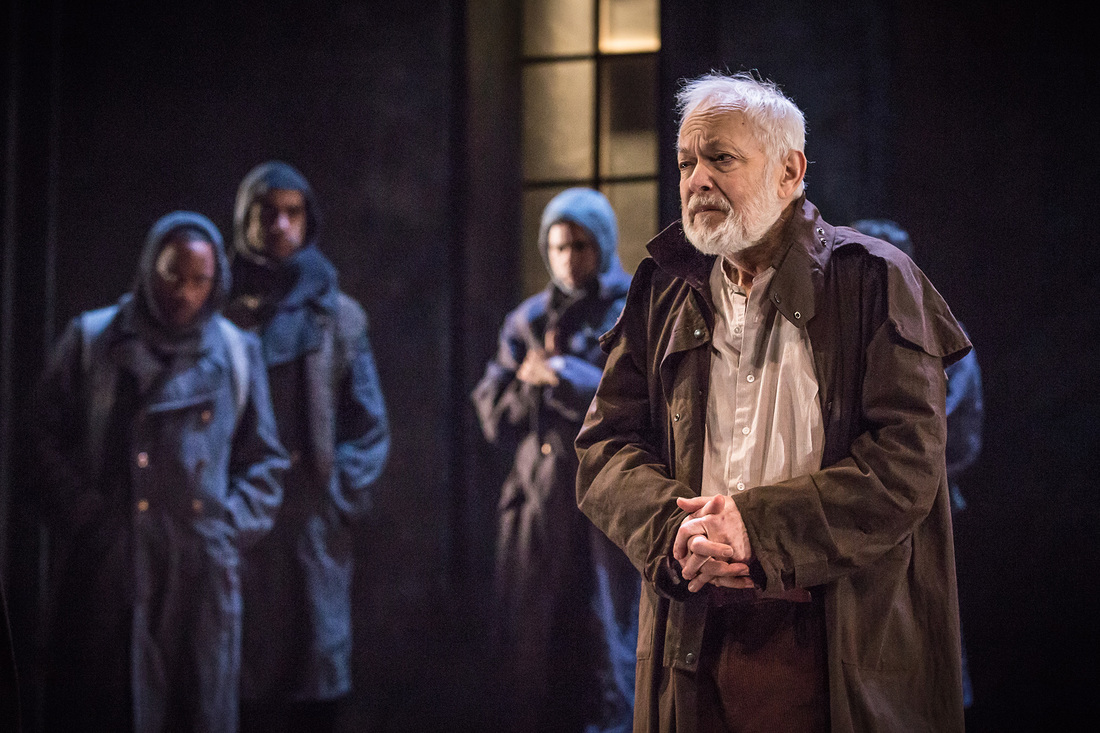 Touching: Michael Pennington as King Lear. Picture by Marc Brenner.
Touching: Michael Pennington as King Lear. Picture by Marc Brenner.
KING LEAR
* * * *
April 4, 2016
Royal Theatre, Northampton, until Saturday, April 23, 2016, then touring
MICHAEL Pennington is heart-rending and deeply moving as the tragic king in Max Webster's clear, elegant production.
For the full review, visit www.whatsonstage.com
* * * *
April 4, 2016
Royal Theatre, Northampton, until Saturday, April 23, 2016, then touring
MICHAEL Pennington is heart-rending and deeply moving as the tragic king in Max Webster's clear, elegant production.
For the full review, visit www.whatsonstage.com
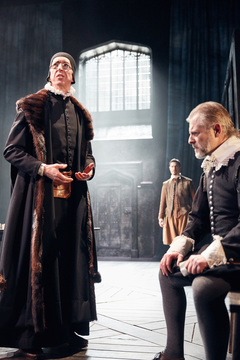 Intrigue: From left, Michael Mears, Philip Correia and Jonathan Guy Lewis in The Herbal Bed. Picture by Mark Douet.
Intrigue: From left, Michael Mears, Philip Correia and Jonathan Guy Lewis in The Herbal Bed. Picture by Mark Douet.
THE HERBAL BED
* * * *
February 13, 2016
Royal Theatre, Northampton, until Saturday, February 27, 2016, then touring
ARTISTIC director James Dacre brings history handsomely to life in this revival of Peter Whelan’s play about Shakespeare’s daughter, accused of adultery.
For the full review, visit www.whatsonstage.com
* * * *
February 13, 2016
Royal Theatre, Northampton, until Saturday, February 27, 2016, then touring
ARTISTIC director James Dacre brings history handsomely to life in this revival of Peter Whelan’s play about Shakespeare’s daughter, accused of adultery.
For the full review, visit www.whatsonstage.com
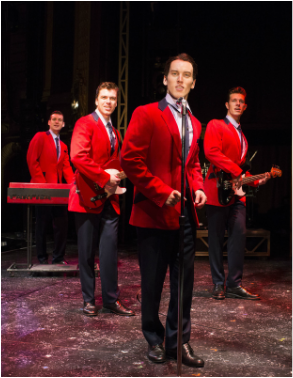 Jersey Boys: From left, Sam Ferriday, Stephen Webb, Matt Corner and Lewis Griffiths. Picture by Helen
Maybanks.
Jersey Boys: From left, Sam Ferriday, Stephen Webb, Matt Corner and Lewis Griffiths. Picture by Helen
Maybanks.
JERSEY BOYS
* * * *
January 27, 2016
Derngate, Northampton, until Saturday, February 6, 2016, then tour continues
THE story of Frankie Valli and the Four Seasons is as much about loyalty as it is about music. How much of it is historically accurate will always be a matter of debate – as the show itself acknowledges – but it certainly makes for a compelling musical.
At the heart of the story is Valli’s possibly misguided devotion to his mentor Tommy DeVito, who brought him into his band and then proceeded to lumber him with dodgy debts that took years to pay off. Against this is the young Frankie’s handshake deal with songwriter Bob Gaudio that outlasted every other relationship and sparked a string of memorable hits.
Telling a narrative that covers decades proves challenging for the writers Marshall Brickman and Rick Elice, and much of the emotional content is lost along the way as a result. What holds the show together – and packs a powerful punch in the process – is the music. Gaudio’s tunes are timeless and toe-tapping, and the delivery by the on-stage quartet, backed by a tight ten-piece band, is never less than impressive.
Matt Corner has a vocal range to match Valli’s own, and his big numbers are spectacular. Can’t Take My Eyes Off You is a particular standout, but all the favourites are here, from Sherry and Big Girls Don’t Cry to the luscious My Eyes Adored You, and he gets stunning vocal support from Sam Ferriday (Gaudio), Stephen Webb (DeVito) and Lewis Griffiths as the mellifluous bass Nick Massi.
Des McAnuff’s production races through the years, switching from scene to scene and song to song at the drop of a fedora, which makes the whole thing feel a little relentless. The performers are also not helped by a terrible sound balance, which pushes them so low in the overall mix as to be almost inaudible far too often.
But the performances themselves are enjoyable and highly watchable, and there’s no escaping the class of the songs and the musicianship on display.
* * * *
January 27, 2016
Derngate, Northampton, until Saturday, February 6, 2016, then tour continues
THE story of Frankie Valli and the Four Seasons is as much about loyalty as it is about music. How much of it is historically accurate will always be a matter of debate – as the show itself acknowledges – but it certainly makes for a compelling musical.
At the heart of the story is Valli’s possibly misguided devotion to his mentor Tommy DeVito, who brought him into his band and then proceeded to lumber him with dodgy debts that took years to pay off. Against this is the young Frankie’s handshake deal with songwriter Bob Gaudio that outlasted every other relationship and sparked a string of memorable hits.
Telling a narrative that covers decades proves challenging for the writers Marshall Brickman and Rick Elice, and much of the emotional content is lost along the way as a result. What holds the show together – and packs a powerful punch in the process – is the music. Gaudio’s tunes are timeless and toe-tapping, and the delivery by the on-stage quartet, backed by a tight ten-piece band, is never less than impressive.
Matt Corner has a vocal range to match Valli’s own, and his big numbers are spectacular. Can’t Take My Eyes Off You is a particular standout, but all the favourites are here, from Sherry and Big Girls Don’t Cry to the luscious My Eyes Adored You, and he gets stunning vocal support from Sam Ferriday (Gaudio), Stephen Webb (DeVito) and Lewis Griffiths as the mellifluous bass Nick Massi.
Des McAnuff’s production races through the years, switching from scene to scene and song to song at the drop of a fedora, which makes the whole thing feel a little relentless. The performers are also not helped by a terrible sound balance, which pushes them so low in the overall mix as to be almost inaudible far too often.
But the performances themselves are enjoyable and highly watchable, and there’s no escaping the class of the songs and the musicianship on display.
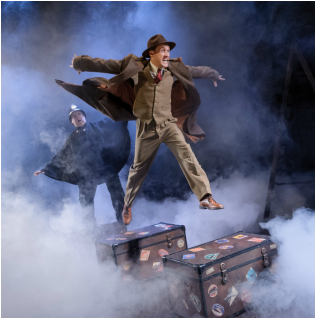 Richard Ede as Hannay, pursued by Rob Witcomb. Picture by Dan Tsantilis.
Richard Ede as Hannay, pursued by Rob Witcomb. Picture by Dan Tsantilis.
THE 39 STEPS
* * * *
January 8, 2016
Royal Theatre, Northampton, until Saturday, January 16, 2016, then tour continues
TEN years in the West End and previous tours of the UK have not dimmed the infectious silliness of this loose, larky adaptation of Alfred Hitchcock’s film of The 39 Steps. Now a team of co-producers has joined up to send the witty, wacky production out on the road once more, kicking off in the warmly welcoming environs of Northampton’s Royal Theatre.
Retaining its cast of just four – who between them play a multitude of roles across genders, accents and costumes – the show is an affectionate, if irreverent, tribute to Hitch and his famous black-and-white version of the pre-war boys’ own adventure story in which hero Richard Hannay becomes unwittingly embroiled in an international spy plot.
The narrative ranges from a quiet London flat to the moors of Scotland before the thrilling finale at the London Palladium, and part of the immense fun is mined from the crazy, convoluted and occasionally inspired way these locations are delivered on a mostly bare theatre stage. Every trick in the book is employed and exploited, and with the rapid-fire delivery and impeccable slickness of the four players, the result is breathlessly entertaining.
Richard Ede is a fine, upstanding Hannay, pipe clenched firmly below his stiff upper lip, and his straight playing of the clever comedy is one of the keys to its success. An accomplished Olivia Greene gets a little more leeway in Patrick Barlow’s lustrously funny script, but the greatest liberties for laughs are offered to Andrew Hodges and Rob Witcomb as the two stooges, whose job it is to make up pretty much the whole of the rest of the cast. Whether playing a German secret agent or a Highland landlady, the timing and interaction between these two is one of the undoubted highlights of the show.
Tour director James Farrell revives Maria Aitken’s production with pace and panache, while Peter McKintosh’s designs, Ian Scott’s lighting and Mic Pool’s sound all add enormously to the effectiveness of the well-drilled performance. Even Hitch himself makes his traditional cameo appearance, albeit in silhouette in a very funny chase sequence, and there are sly references to plenty of other Hitchcock classics thrown in for good measure.
As fresh and daft as ever, this production certainly justifies the decision to launch a new tour. If you haven’t seen it before, take the opportunity to catch it. If you have, be reassured that there’s still plenty of life in the old girl yet.
* * * *
January 8, 2016
Royal Theatre, Northampton, until Saturday, January 16, 2016, then tour continues
TEN years in the West End and previous tours of the UK have not dimmed the infectious silliness of this loose, larky adaptation of Alfred Hitchcock’s film of The 39 Steps. Now a team of co-producers has joined up to send the witty, wacky production out on the road once more, kicking off in the warmly welcoming environs of Northampton’s Royal Theatre.
Retaining its cast of just four – who between them play a multitude of roles across genders, accents and costumes – the show is an affectionate, if irreverent, tribute to Hitch and his famous black-and-white version of the pre-war boys’ own adventure story in which hero Richard Hannay becomes unwittingly embroiled in an international spy plot.
The narrative ranges from a quiet London flat to the moors of Scotland before the thrilling finale at the London Palladium, and part of the immense fun is mined from the crazy, convoluted and occasionally inspired way these locations are delivered on a mostly bare theatre stage. Every trick in the book is employed and exploited, and with the rapid-fire delivery and impeccable slickness of the four players, the result is breathlessly entertaining.
Richard Ede is a fine, upstanding Hannay, pipe clenched firmly below his stiff upper lip, and his straight playing of the clever comedy is one of the keys to its success. An accomplished Olivia Greene gets a little more leeway in Patrick Barlow’s lustrously funny script, but the greatest liberties for laughs are offered to Andrew Hodges and Rob Witcomb as the two stooges, whose job it is to make up pretty much the whole of the rest of the cast. Whether playing a German secret agent or a Highland landlady, the timing and interaction between these two is one of the undoubted highlights of the show.
Tour director James Farrell revives Maria Aitken’s production with pace and panache, while Peter McKintosh’s designs, Ian Scott’s lighting and Mic Pool’s sound all add enormously to the effectiveness of the well-drilled performance. Even Hitch himself makes his traditional cameo appearance, albeit in silhouette in a very funny chase sequence, and there are sly references to plenty of other Hitchcock classics thrown in for good measure.
As fresh and daft as ever, this production certainly justifies the decision to launch a new tour. If you haven’t seen it before, take the opportunity to catch it. If you have, be reassured that there’s still plenty of life in the old girl yet.
For Northampton reviews from 2015, please click here
For Northampton reviews from 2014, please click here
For Northampton reviews from 2013, please click here
For Northampton reviews from 2012, please click here
For Northampton reviews from 2011, please click here
For Northampton reviews from 2010, please click here
For Northampton reviews from 2009, please click here
For Northampton reviews from 2008, please click here
